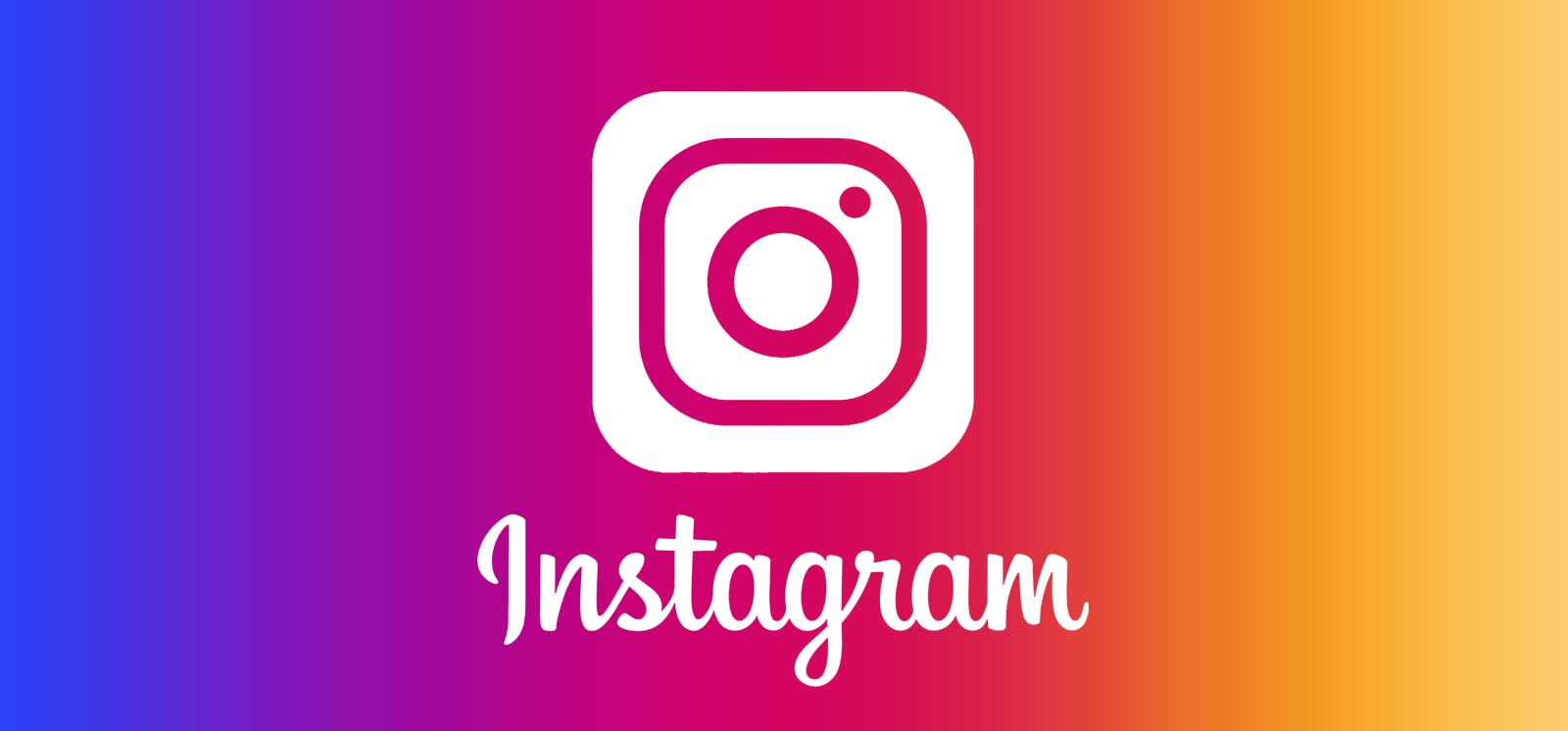Below includes context, techniques, and strategies to organically grow your Instagram following, make the Instagram algorithm work in your favor, and drive engagement.
Some of the specific topics we’ll touch on include:
- An explanation of the two types of accounts on Instagram
- Optimizing your content for the platform
- How to properly use hashtags
- Location tagging
- Strategies for testing and optimizing your content
- Five specific tactics for driving engagement
- Instagram pods
- Account takeovers
The last section of this guide will explain how ridiculously easy it is to use your Instagram content to grow your Facebook page.
We are not going to touch on the use of bots. Although widely popular, the use of bots is banned by Instagram. If you want an understanding of bots, you can read about this guy’s two-year stint using them.
Sorry, bots.
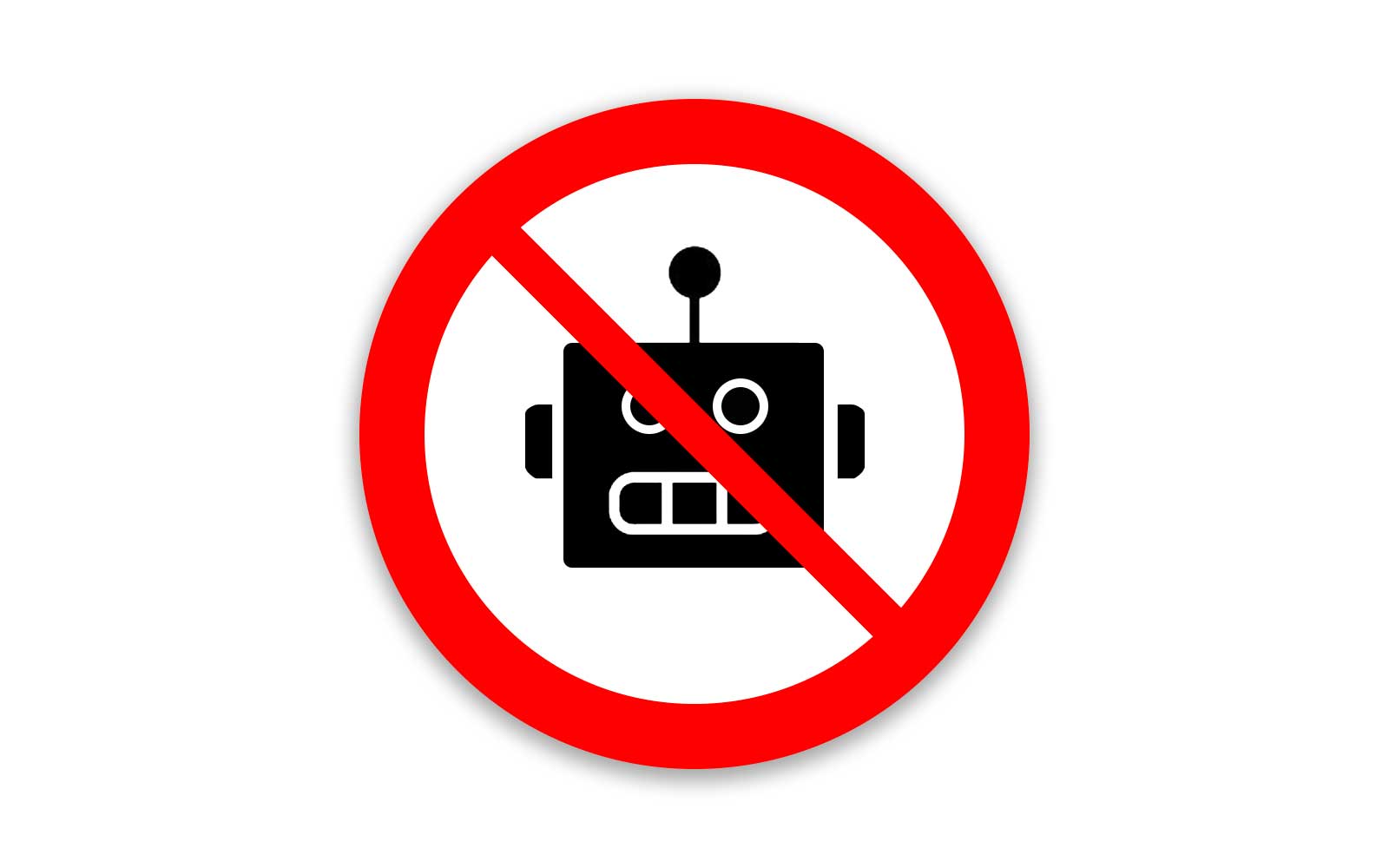
This article also does not touch on the stories feature which Instagram has given excellent growth mechanisms to including the use of hashtags and location tagging. We will provide an equally thorough write-up on using stories at a later time.
Keep in mind, the guide below is just that – a guide. It will provide a good foundational understanding of the platform, but it’s important to not box yourself into one way of thinking. Those who take risks and lead the way with creativity will reap the rewards of doing so (see: Gary Vaynerchuk’s, 60 Second Club).
For the sake of keeping this already very long guide a little shorter, let’s jump right in.
Brand vs Feature Account
There are two types of organization related accounts you’ll find on Instagram. One is a feature account and the other is a brand account.
Feature Account
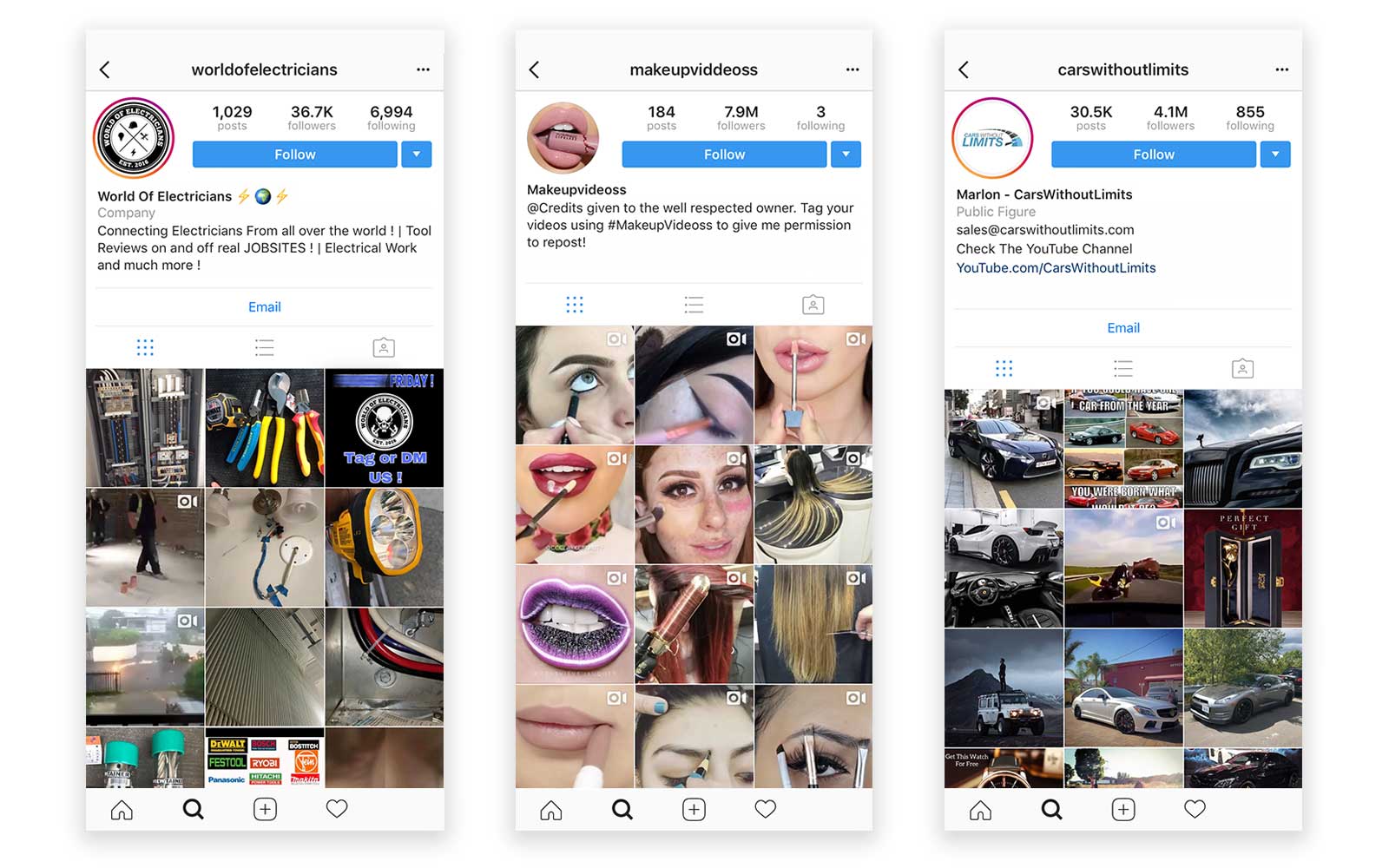
Three feature accounts from the construction, beauty, and automotive industries, respectively
A feature account consolidates content from other accounts and features the content on its own profile.
As the operator of a feature account, you have the advantage of not having to create original content which can take much more time than sourcing content.
There is one rule of being a feature account that you must follow. Content attribution. You must tag the account whose content you’re using in the caption and/or the image itself of your post.
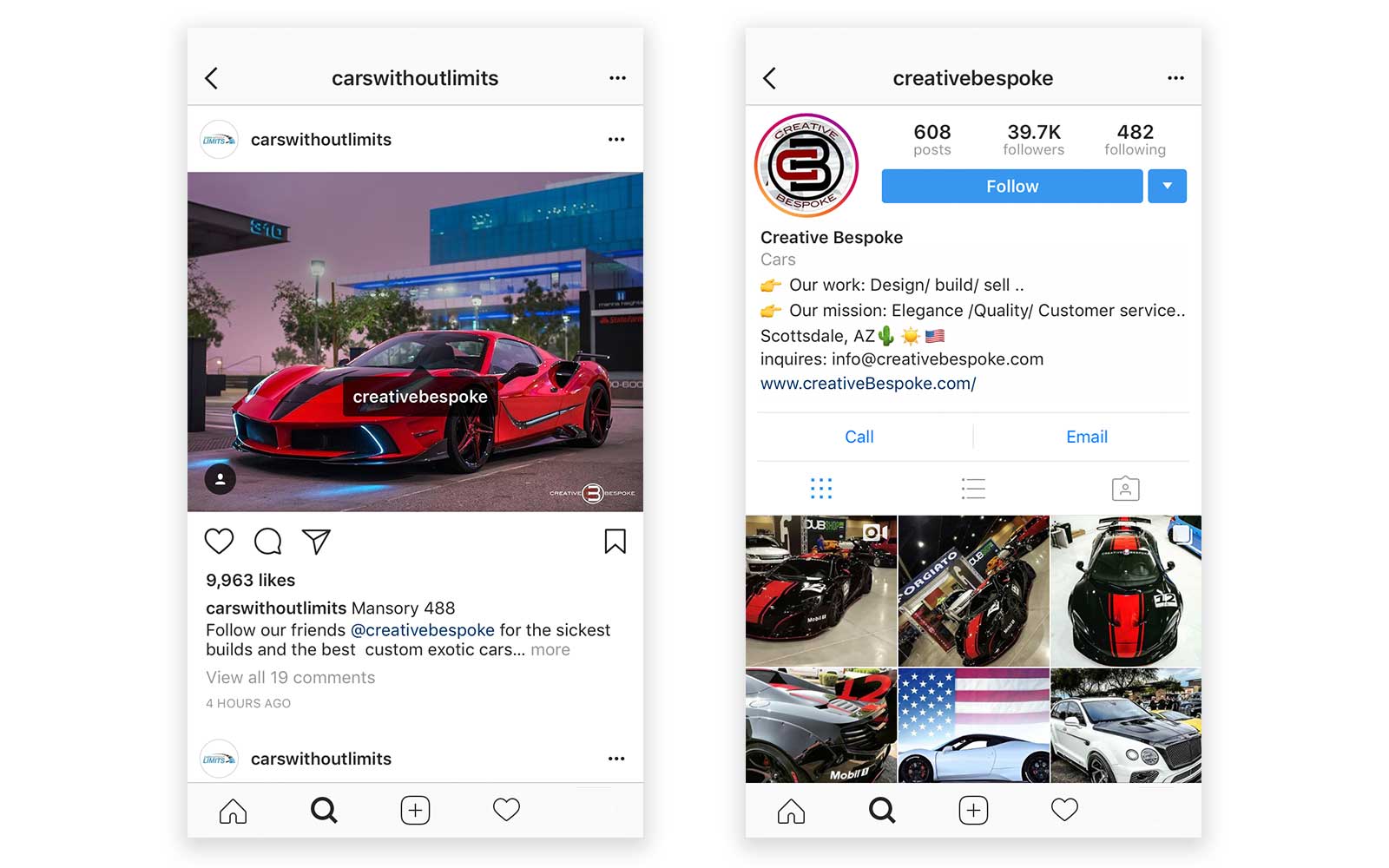
On the left is a feature post with attribution given in the image and the caption. On the right is the account tagged, a custom automotive business.
If you’re starting a feature account in a niche where there are already other, well-established feature accounts, then you’ll be competing with those feature accounts for followers and need to find a competitive edge.
You may do this by finding content that those accounts aren’t seeing, by being the first to post the content they may have otherwise posted, by writing the best post copy, or by doing all three.
How do you find unique content?
The same way you’ll find all of the content you’ll be featuring.
A combination of searching through hashtags, using Instagram’s “Suggestions For You” feature, and by seeing what other accounts are engaging with.
By looking through content in the Explore and Most Recent sections of hashtags related to your niche you can find related content.
You’ll want to start following some of the accounts who consistently put out quality content and who you may want to feature more than once.
As soon as you follow an account, a list of other accounts will display labeled “Suggestions For You”. You can also press the small down-facing triangle at any time to access them. These accounts will be ordered by relevance and popularity. The farther down the list you go the less relevant and less popular the account will be. You may also find accounts that are perfectly relevant but not very popular, and this is where you find your diamonds in the rough.
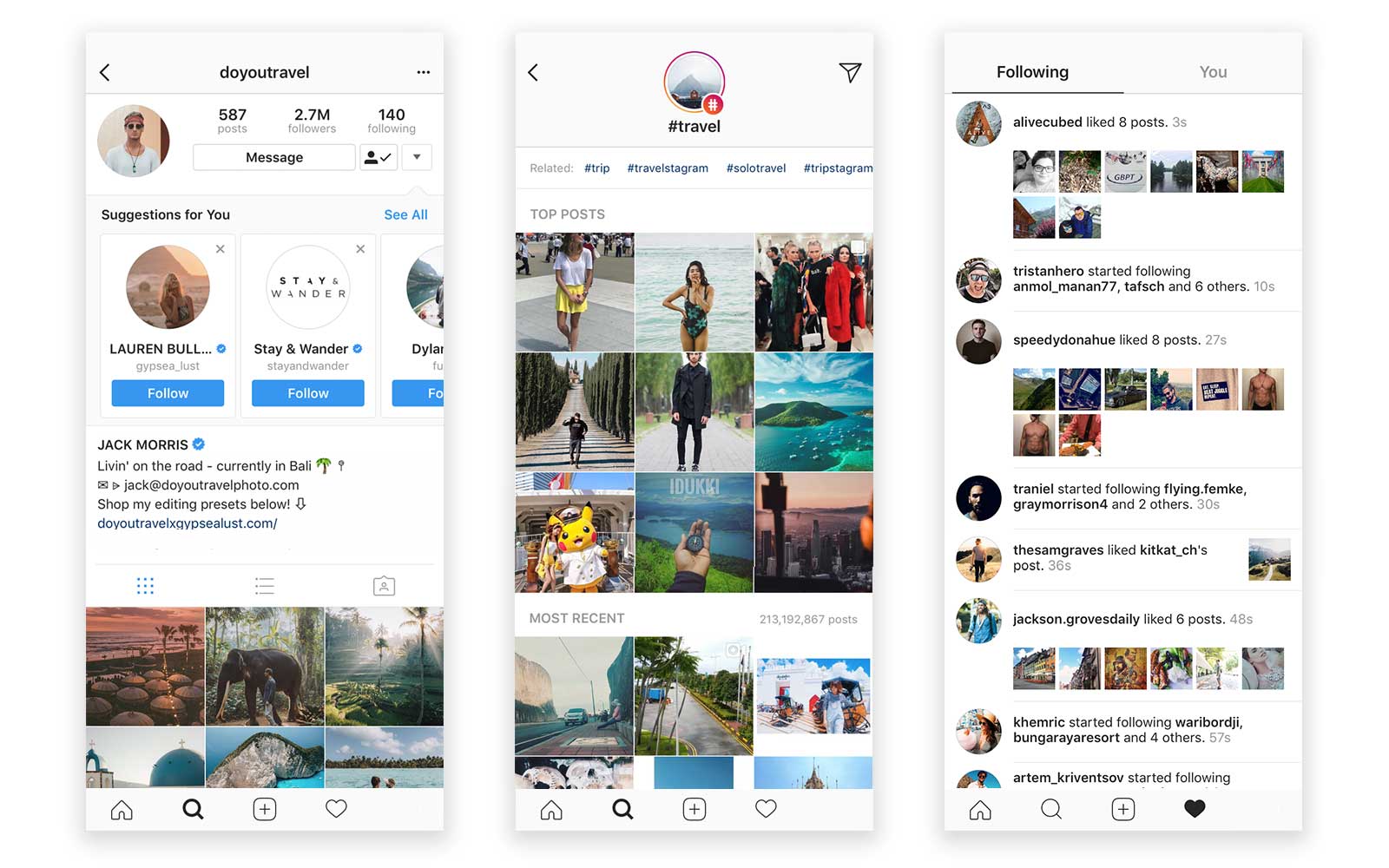
On the left, you can see the “Suggestions For You” section. In the middle is the “Explore” section of the #travel hashtag. On the right is the activity of accounts
Finding “unique” content will simply mean putting in more time than your competitors are willing to find the hidden gems.
Keep in mind, if you set out to find unique content, other feature accounts can see whose content you’re using and start using their content as well.
Speed is important because it gives you the first shot at the best content before your competition sees it. Also, if users are following your account and your competitor’s account and you both post the same piece of content, then followers are likely to engage with the first post they see but not the second.
Arguably the least effective way to stand out is in the caption. A good example of an account that uses the caption to drive engagement is Beard Muscles. They’re a feature account, but use the caption to communicate their message of personal growth and with 271,000 followers it seems to be working for them.
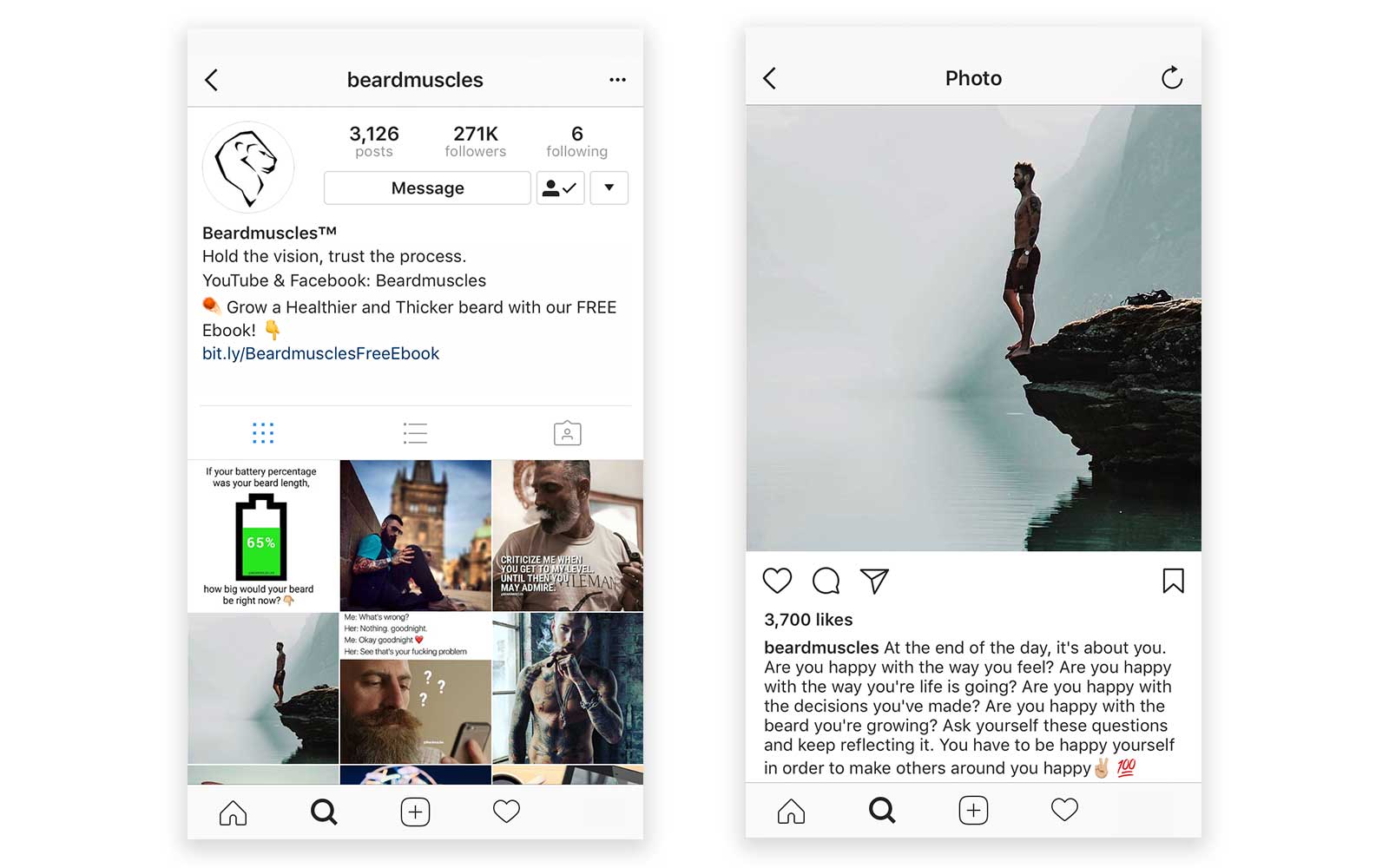
On the right is a long form caption where a user has to press “more” to see.
Branded Hashtags and Tagging
Another great way to find content is to let it come to you.
Choose a hashtag that is specific to your feature account and include it in your profile, letting followers know they can use that hashtag in their post to be discovered. Then you can search your own hashtag and see all of the posts that include your hashtag.
This also gives your account exposure as the followers of those using your hashtag see the hashtag and find your account when they follow the breadcrumbs.
Additionally, you can ask people to tag your account in their post copy or in the image itself, providing the same results as the hashtag.
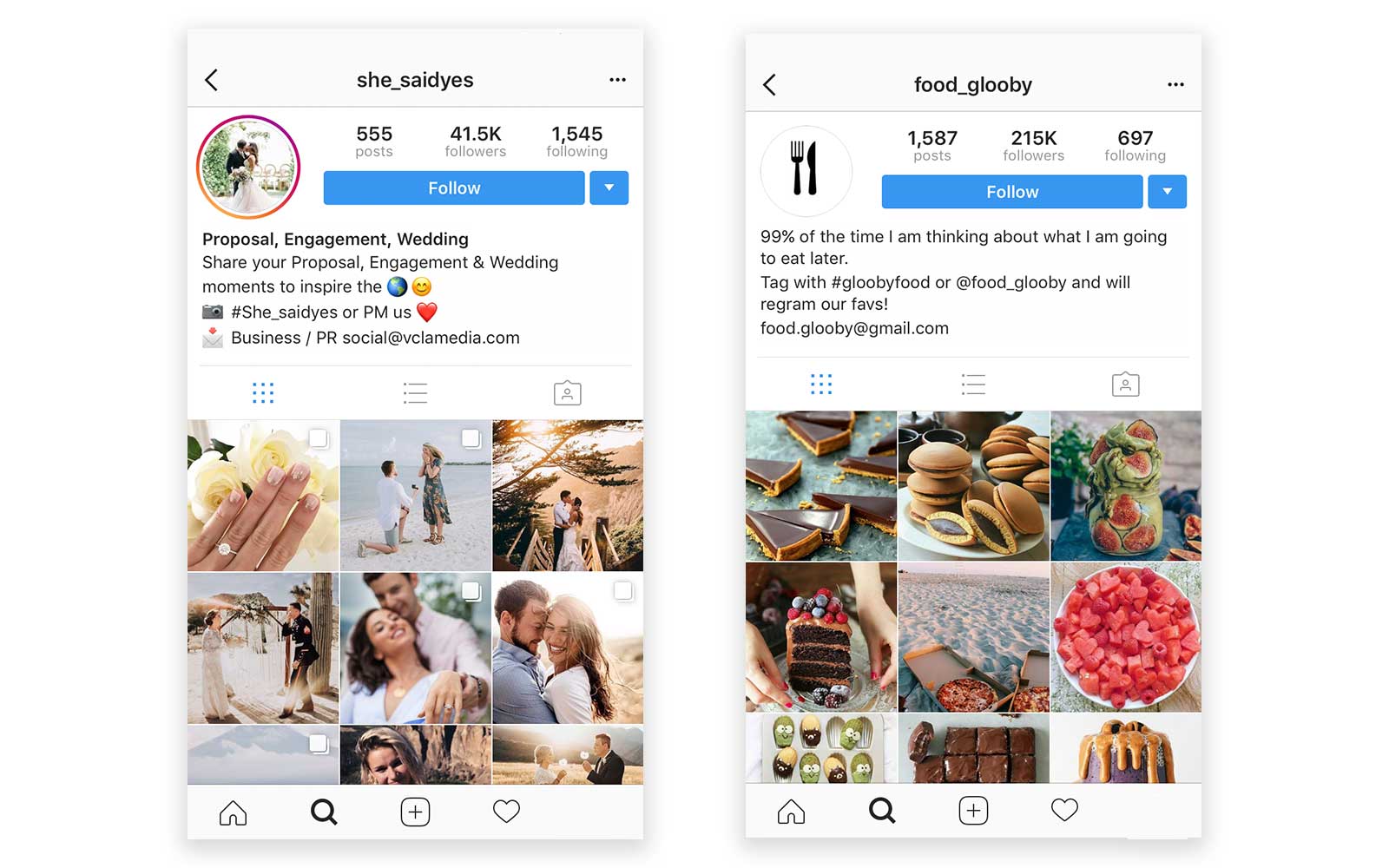
Both accounts use a branded hashtag. @food_glooby gives users the option to tag them as well.
Brand Account
When I’m referring to a brand account, I’m really referring to creating and posting original content.
One strategy to consider when providing original content is creating content with a consistent look and feel.
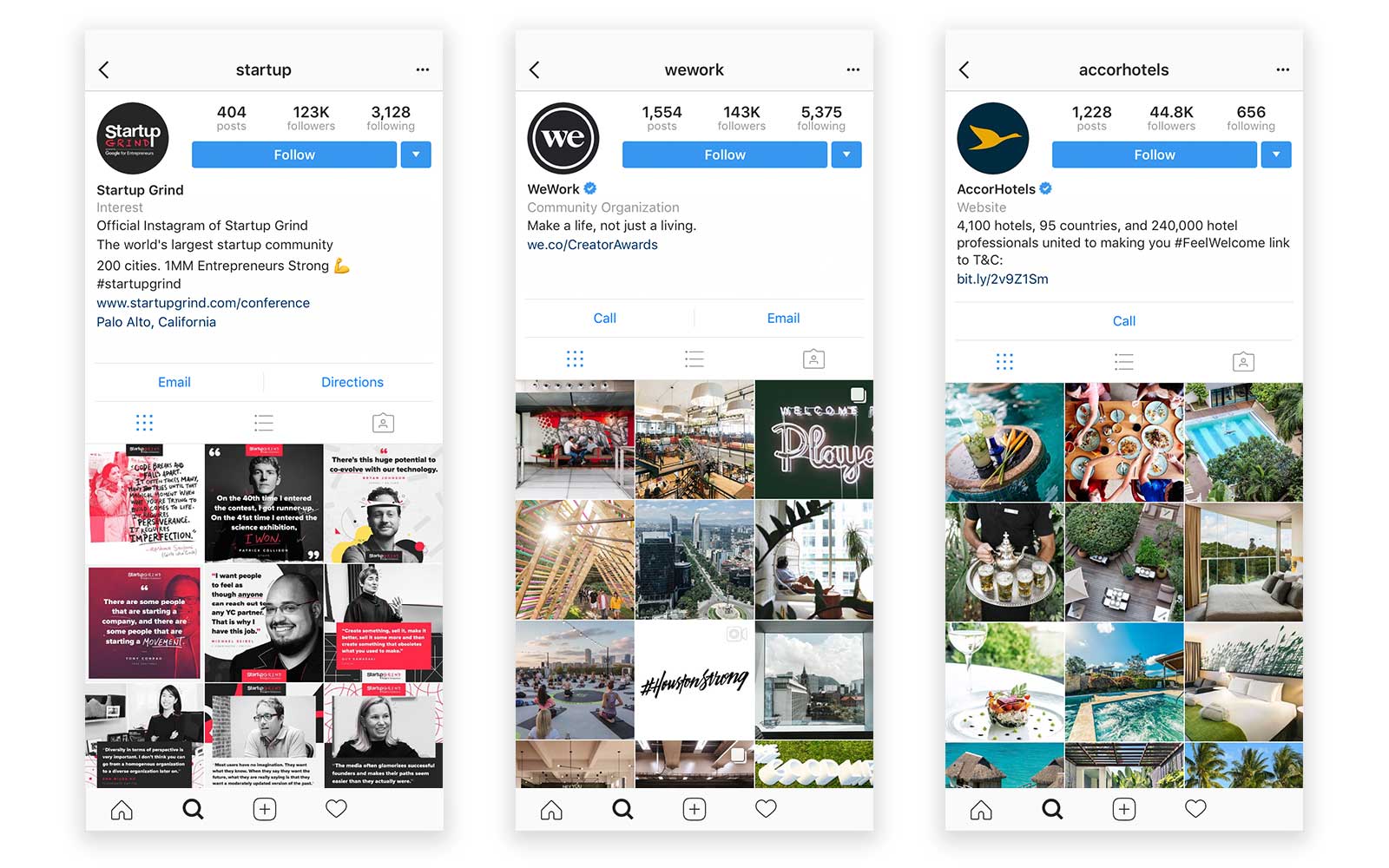
All three accounts have their own distinct look and the consistency is clear for each.
Consistency is helpful for a couple reasons.
First, when a user is deciding whether or not to follow your account, they will sometimes look at your wall instead of each individual post. Having a consistent look to your posts can make your wall look more attractive and positively impact a user’s decision.
Second, users follow your account because they want specific content in their feed. They are permitting you to have their attention because they expect you’re going to deliver a specific type of content. When you veer from their expectations you’re providing content that they didn’t sign up for.
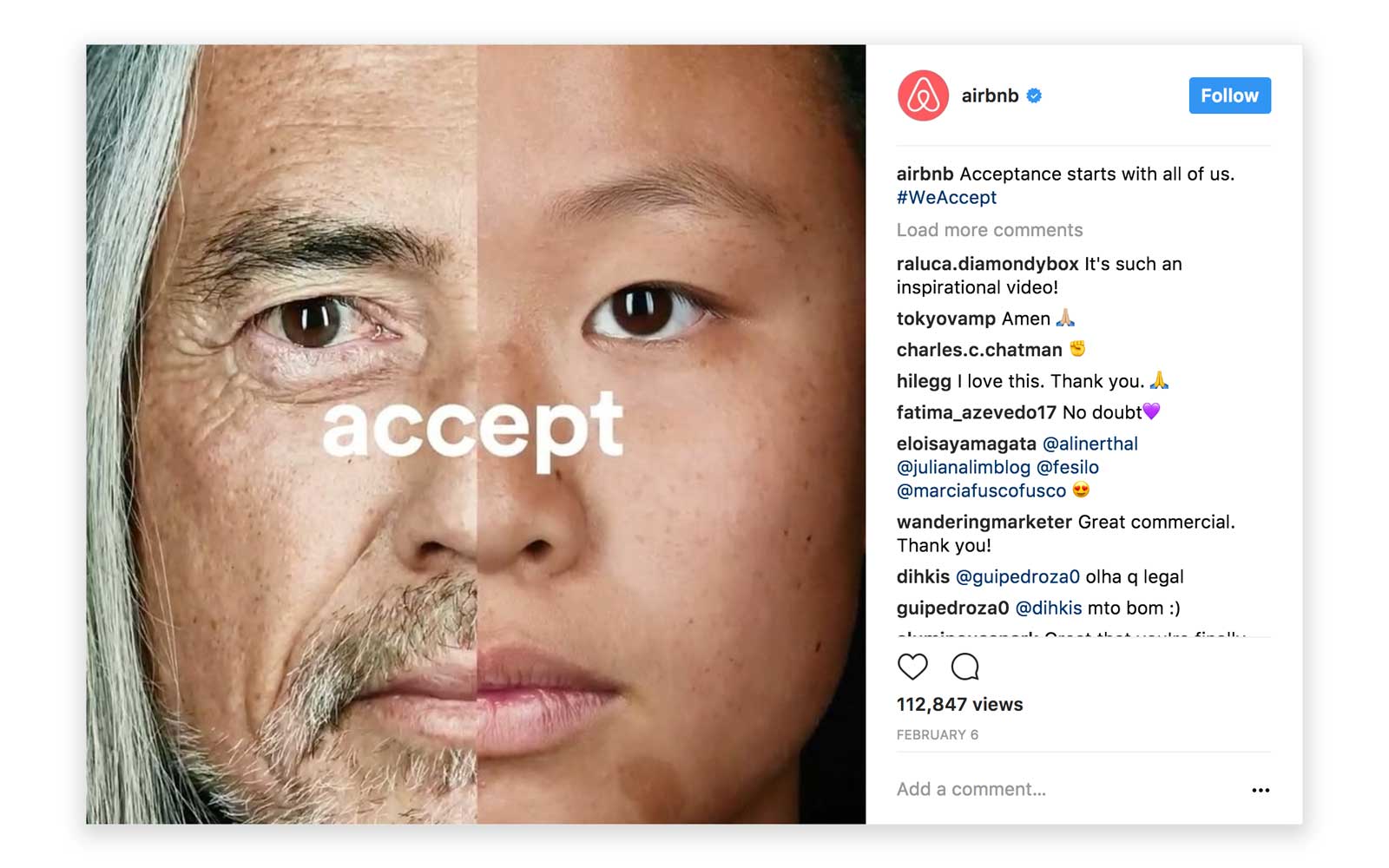
Airbnb’s #WeAccept campaign temporarily left their images of beautiful homes and received overwhelming positive sentiment for the brand.
Taking a chance on something different can pay off, as was the case with Airbnb’s #WeAccept campaign, but if not done properly you risk losing the interest of a portion of your audience who wants to see the usual stuff from you.
Featuring As A Brand Account
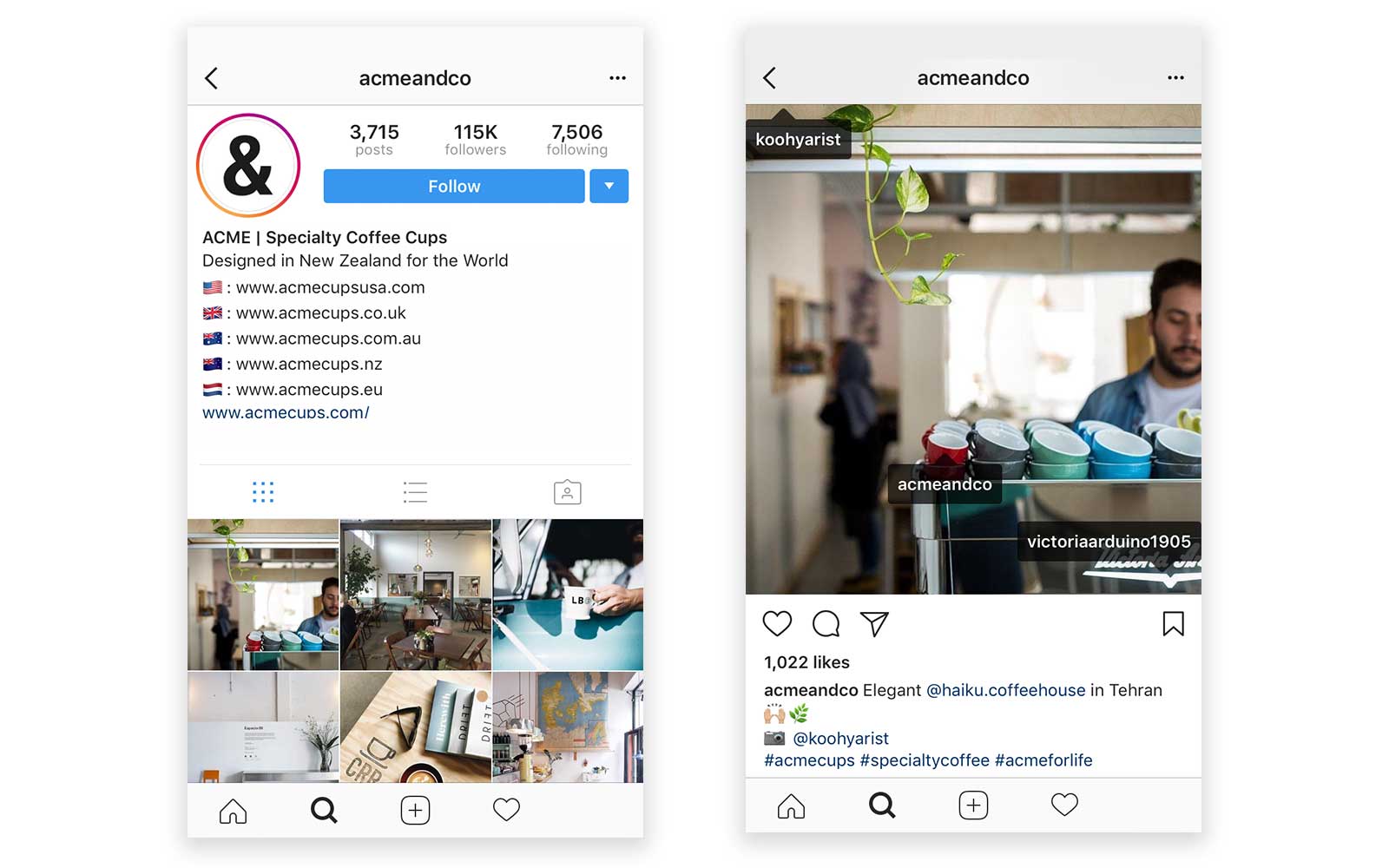
ACME features coffee shops from around the world who use their mugs.
One great way to drive engagement with your audience is to give them the opportunity to give you content like you would a feature account.
You can either do this by following the same principles as the branded hashtag and tagging strategy we outlined earlier or by surprising followers with a feature (same tagging etiquette applies).
Getting Featured
Being on the receiving end of being featured can provide great exposure and result in big gains in followers. Use the same search tactics we laid out earlier to find feature accounts for your industry and follow their instructions to get featured.
Instagram Best Practices
While some of these best practices aren’t directly tied to growth hacking, they can hinder your ability to grow (think: ugly images), so I’ve included some basics.
Content Is King But Context Is Queen
Since Instagram is a mobile platform, users fly through the feed quicker than they would on desktop, often stopping for less than one second to double tap and move on. For this reason, it’s important to catch their attention as quickly as possible. Because Instagram is an almost completely visual platform, your content must stand out visually.
Image/Video Formatting
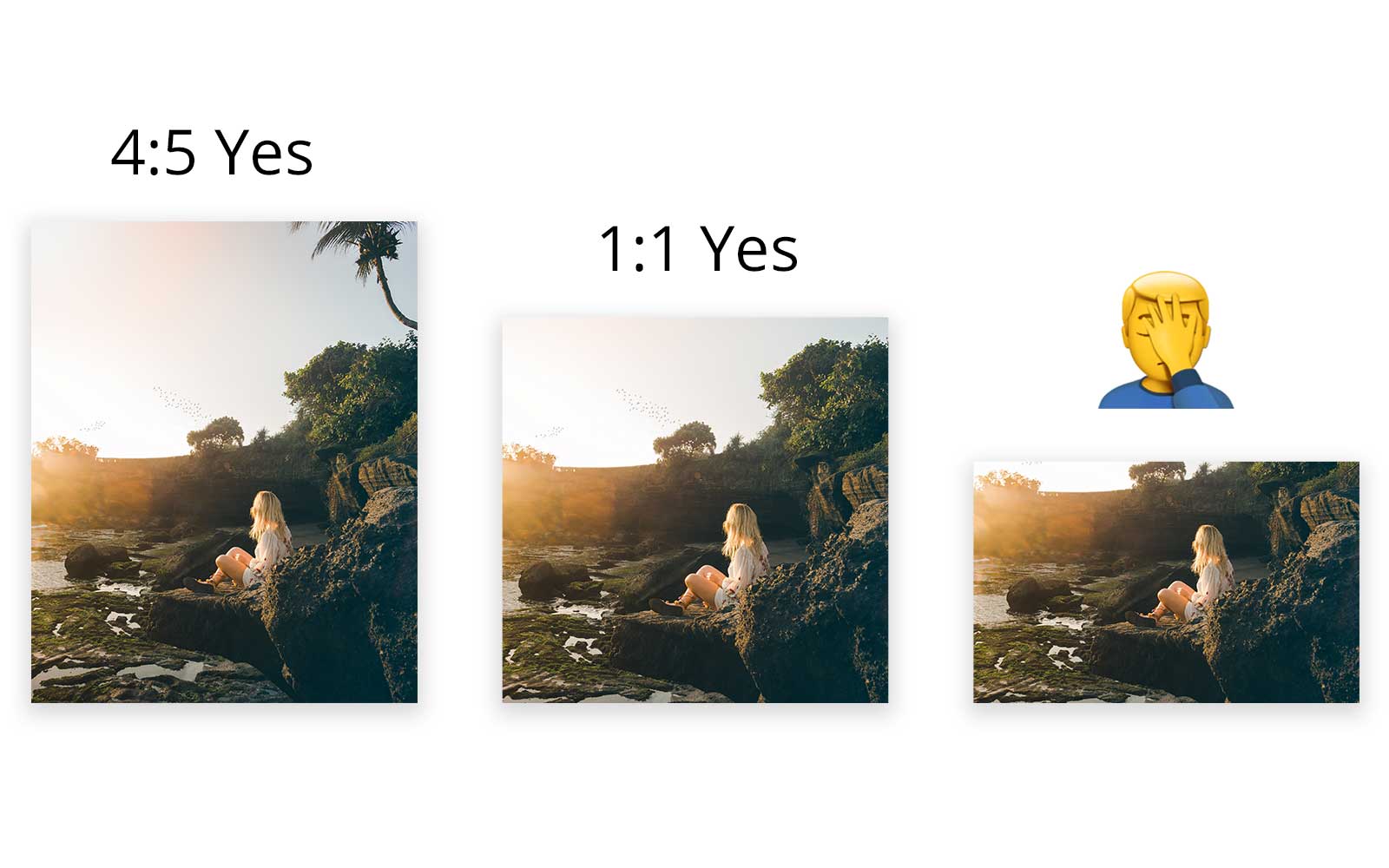
Images should be a 4:5 width to height ratio whenever possible. This allows you to take up the maximum amount of space on the screen. If necessary a 1:1 square image is ok.
If possible, videos should be in a vertical or square format. As with images, this allows your post to take up more screen space and have a greater chance of catching the user’s attention.
Instagram limits video to 60 seconds, so your video should be optimized to fit this time frame.
Post Copy
The length of your copy depends on your goals. Both short-form and long-form copy can work. St. Baldrick’s, a cancer research non-profit uses long-form copy to tell the story of the children they work with. Their top 10 most engaged posts of all time are all long-form.
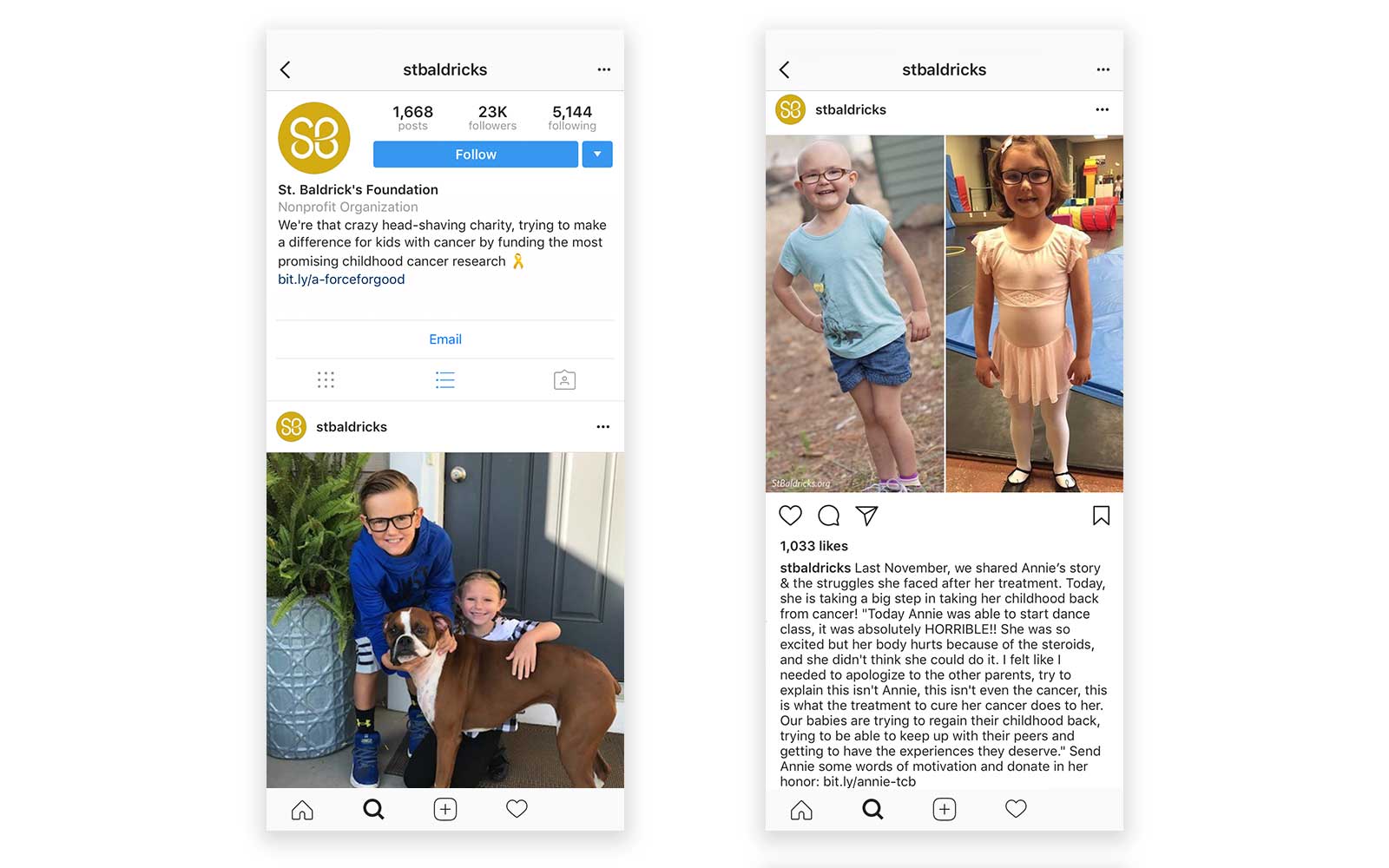
If you’re a business, tell your customers’ stories or your employees’ stories. Southwest Airlines has shared over 1,000 posts and their top two posts of all time include touching, long-form copy, with photos that are unremarkable compared to most of their content.
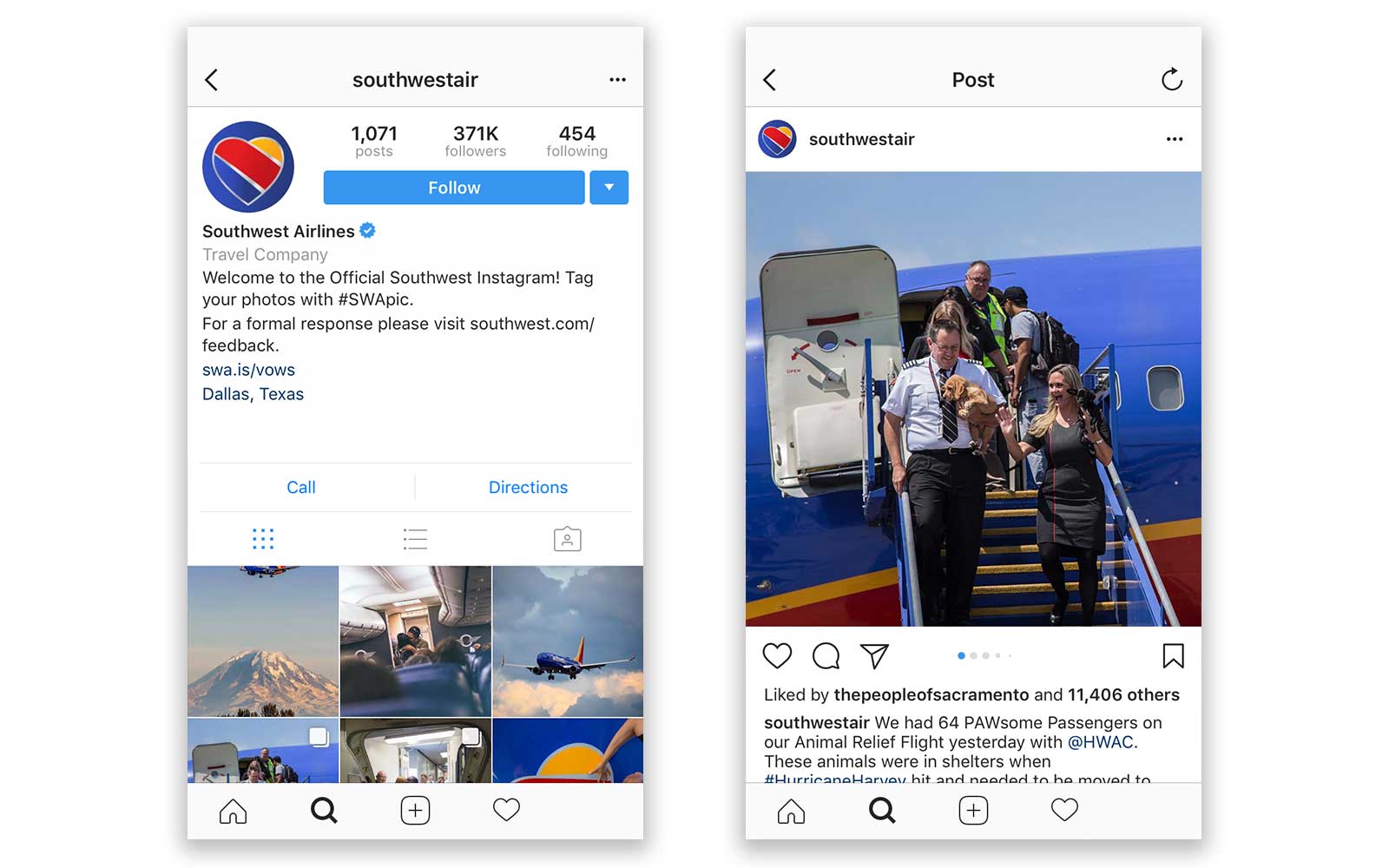
On the right, Southwest’s most engaged with post of all time.
Emojis are perfect for Instagram because they can elicit emotion and inferences without words, keeping the copy shorter.
Links aren’t clickable within descriptions, but if the link is simple enough you may choose to include one. You could also use a URL shortener such as bit.ly to make a long URL simpler. Or you can direct users to the link in your profile, which is clickable.
Profile Name
You may not have realized it, but your profile name is searchable and will be connected to the keywords in it.
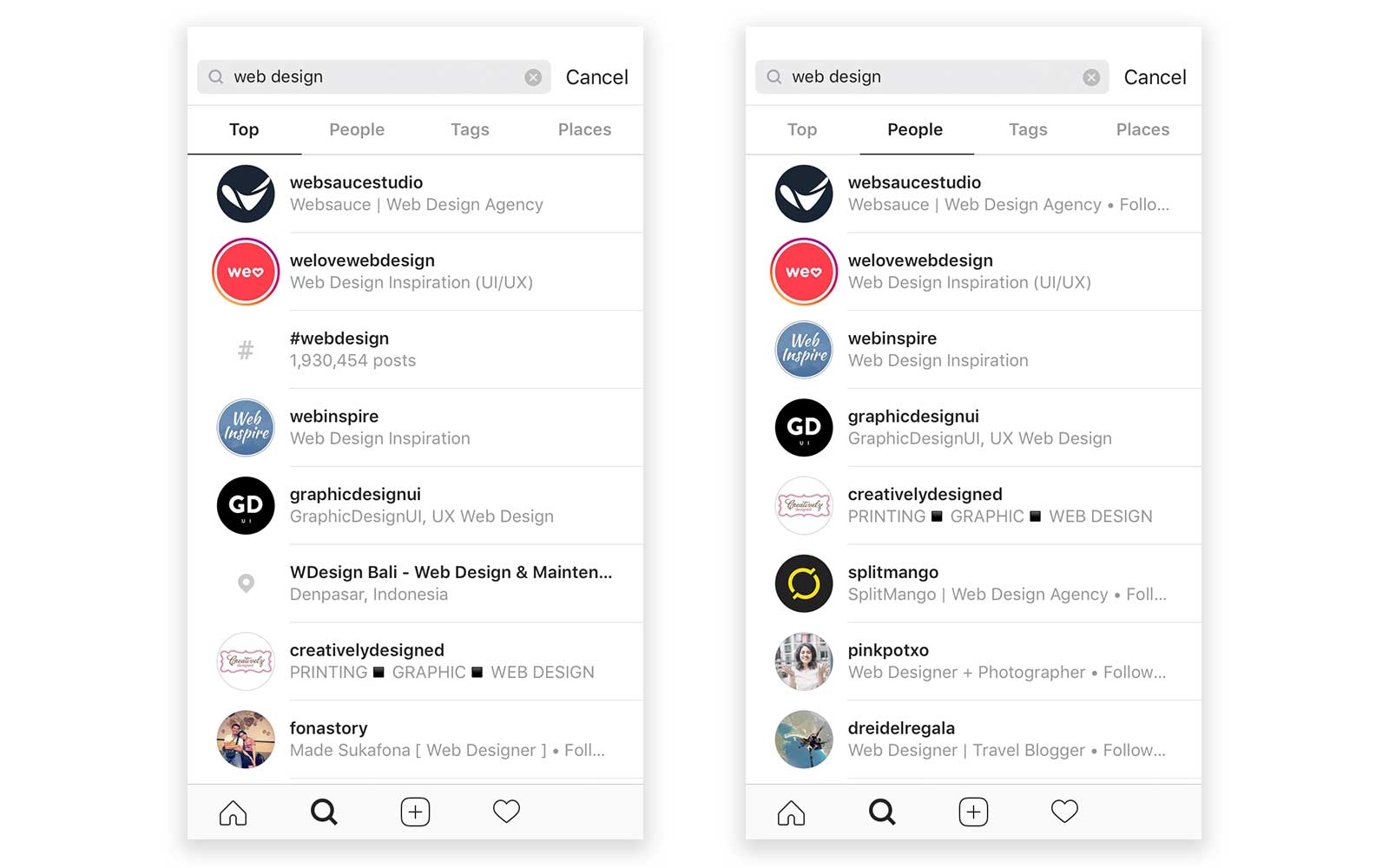
When someone searches for a keyword such as “web design”, the list of accounts that will display are those that have the keyword in the profile name. The order or ranking of these accounts will depend on how relevant Instagram determines they are to you.
If someone you follow follows an account associated with the keyword you entered, Instagram will display that account and include this information in the listing. This immediately gives the user a reason to pick you out from the crowd and builds a little bit of trust.
Since links don’t work within posts you wouldn’t include them and instead may point to the profile link if you want to drive traffic elsewhere. Emojis are perfect for Instagram because they can elicit emotion without words, keeping the copy shorter.
Hashtags
Instagram allows you to use up to 30 hashtags per post. To avoid looking spammy you may want to include the hashtags in the first comment of the post instead of the caption.
Some studies have shown that using too many hashtags can look spammy and turn people off from engaging with your account, so it’s a good idea to test using different numbers of hashtags.
Which hashtags should you choose to use?
The main point of using hashtags is to get featured in the Explore section of that hashtag. The top nine posts, as decided by Instagram’s algorithm, get featured in this section as Top Posts for all to see who search the hashtag. This can result in leaps in your follower count and post engagement.
This is why you have to be selective about the hashtags used. You want to use hashtags that are popular enough to get you visibility (users actually search for it), but not so popular that you’ll be drowned out by other much more popular accounts.
Let’s say you run a spearfishing related account. As of this writing, the term #spearfishing has 668,176 posts which means it has attention. But the top posts have engagement ranging from 5,750 likes to 6,286 video views, so an account with a smaller following would not have a shot at ranking as a top post.
Instead, going for a hashtag such as #spearfish with 62,758 posts where one top post has only 112 likes gives a smaller account a shot at being featured.
You also want to look at hashtags of related interests of your audience. Spearfishermen may also be interested in other forms of hunting, fishing, or surfing, so it would be smart to try something like #surfcity (255,262 posts) or #huntinglife (142,288 posts).
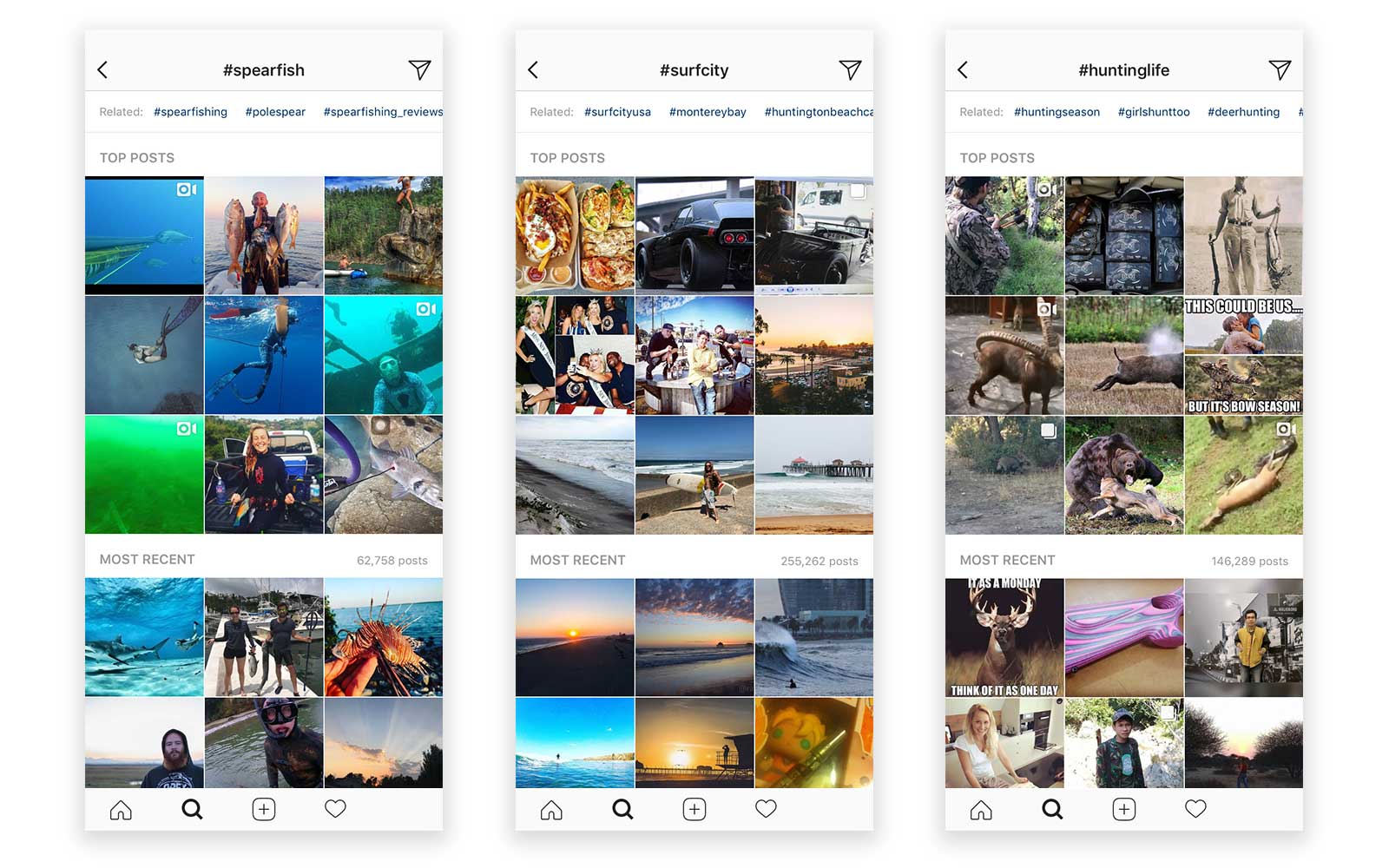
The Explore section will also give you related hashtags which can help you find good hashtag options.
There is an exception to the rule of trying to go after the Explore section. Sometimes you won’t find 30 hashtags that are worth showing up in the Explore section of.
This is often the case with very niche industries.
In this circumstance, it’s not a bad idea to go after hashtags which are out of your range, but still have a lot of attention. This is because you’ll still show up in the Recent section of that hashtag and people browsing around may still find you.
Location Tagging
Always, always, always include a location with your posts. There is no reason not to and it gives you another way to get exposure. Just like hashtags, locations can be, and do, get searched.
On average posts with a location get 79% more engagement.
Locations have their own top posts and most recent section just like hashtags so you can get great exposure here.
You also don’t have to actually be in the location that you’re using in the post so even if you’re posting an image from one month prior, you can still use the location from where the picture or video was taken.
Also, consider choosing the location of an area you’re targeting to win new customers instead of choosing the location where the post was taken. If you’re selling swimsuits online, then you could tag the location of your product with any coastal city where users are likely to be interested in such a product.
The same strategic principles of hashtags apply to choosing a location. For example, while you may have taken an image in New York, New York, that location is incredibly popular and you may have a better shot at choosing a more specific location with less competition such as the Manhattan.
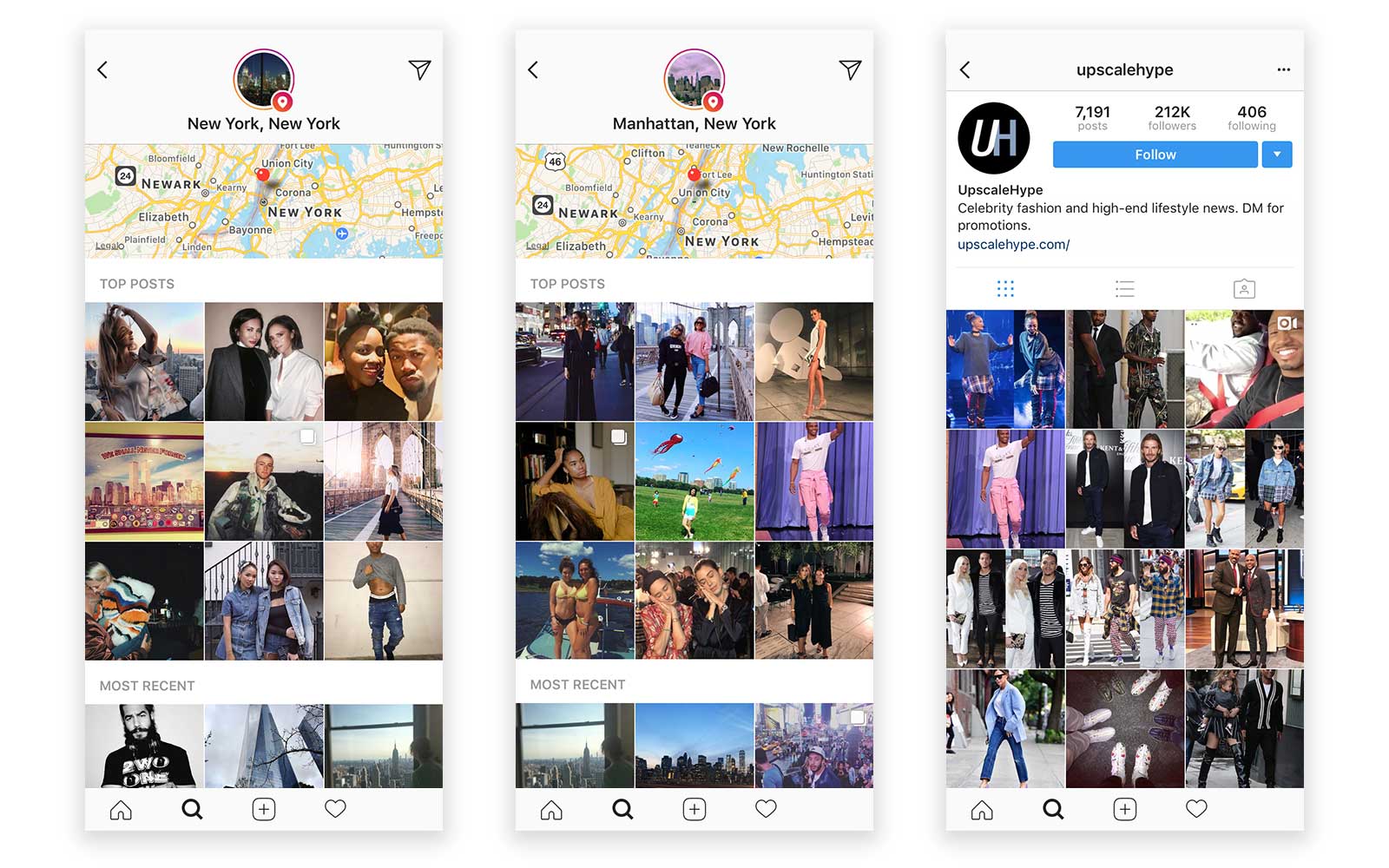
Let’s give @upscalehype a round of applause for smart location tagging.
Testing
You’re testing for two reasons.
The first is to test how many followers you’re getting based on what you’re implementing. The second is to test the engagement levels of your posts.
It’s to be expected that your engagement levels will get lower as your follower count grows, but you should still do what you can to keep them as high as you can.
In particular, the first ten minutes after posting is especially important. This isn’t a number given by Instagram, but what we do know is that the algorithm will show your post to only a sample of users to see the engagement levels before showing it to a larger audience.
The total number of users who see your post will to some degree be based on the engagement traction you’re getting shortly after you post.
This is also partly how the algorithm will decide if you show up in the Explore section for the hashtag in your post.
Testing isn’t going to be as important in the beginning as it will be once your account is popular because you won’t have a large enough sample size to test on. As you get started, you need to focus on execution and growth.
There’s no specific follower count to start testing, so you’ll have to decide for yourself when it makes sense to begin. I would suggest starting at or above 5,000 followers.
When you’re ready, here’s what you can test:
- Which hashtags to use
- Number of hashtags per post
- Number of posts per day
- Type of post (video or image)
- Caption
- Time of day to post
- Day of the week to post
It’s important you only test one thing at a time and for a long enough period of time that you have a good sample size for your testing.
If you test more than one thing at a time you won’t know which aspect of your testing is producing the results you’re seeing.
If you don’t test long enough then your results may be skewed by not having a large enough sample size. I suggest testing for at least one week at a time.
Take Command of Your Testing
One tool I’ve found especially helpful for testing is a mobile app called Command. It’s a straightforward, analytics tool specifically meant for Instagram that will only run you $10 per month.
There are a ton of features and metrics that it provides. The best part might be the ability to track any metrics of your competitors since no login is required to track account data.
Specifically for testing though, here’s a basic example of how to use it for testing number of posts per week against an increase in followers.
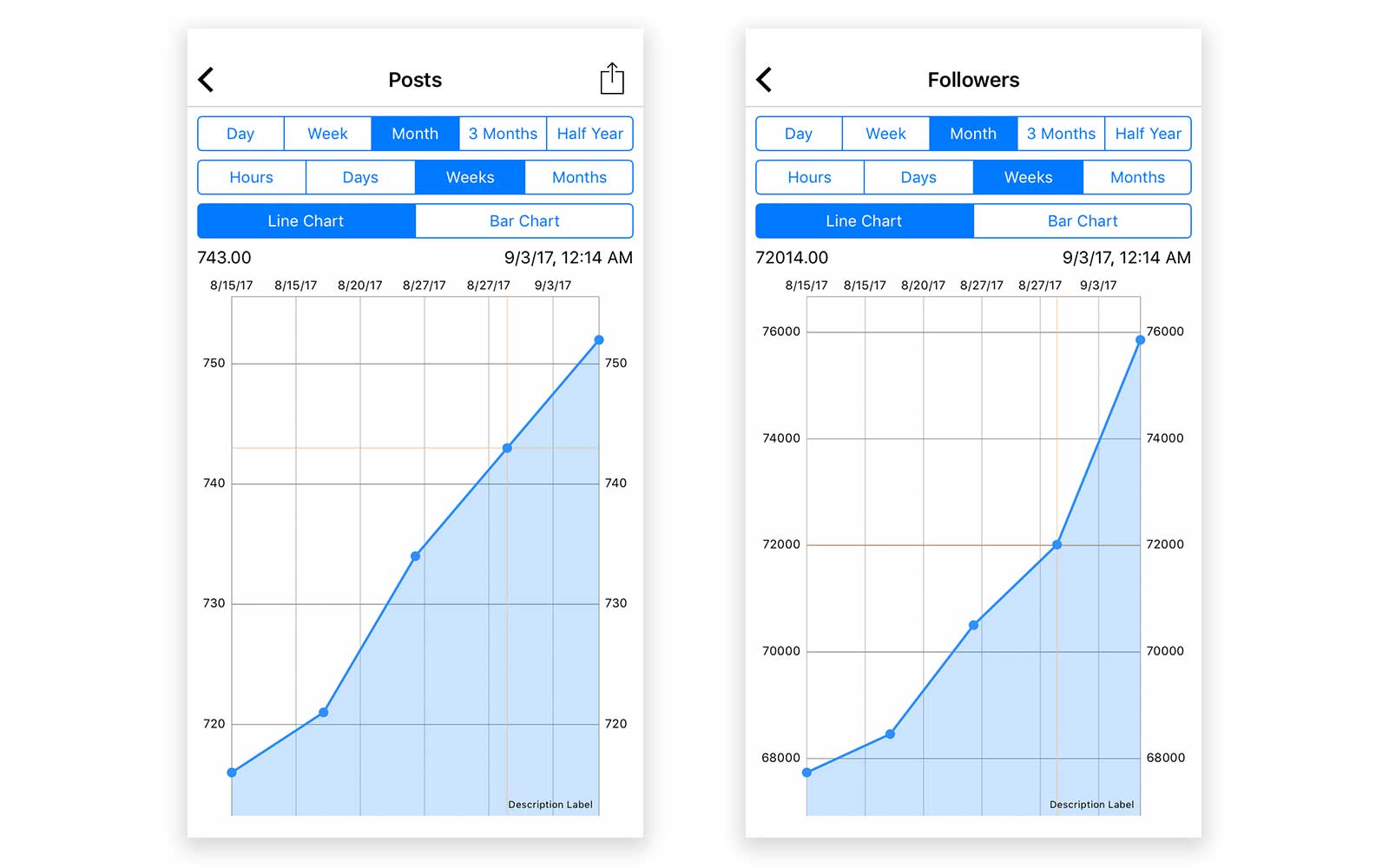
When we export the data to Google Sheets, this is what we see.
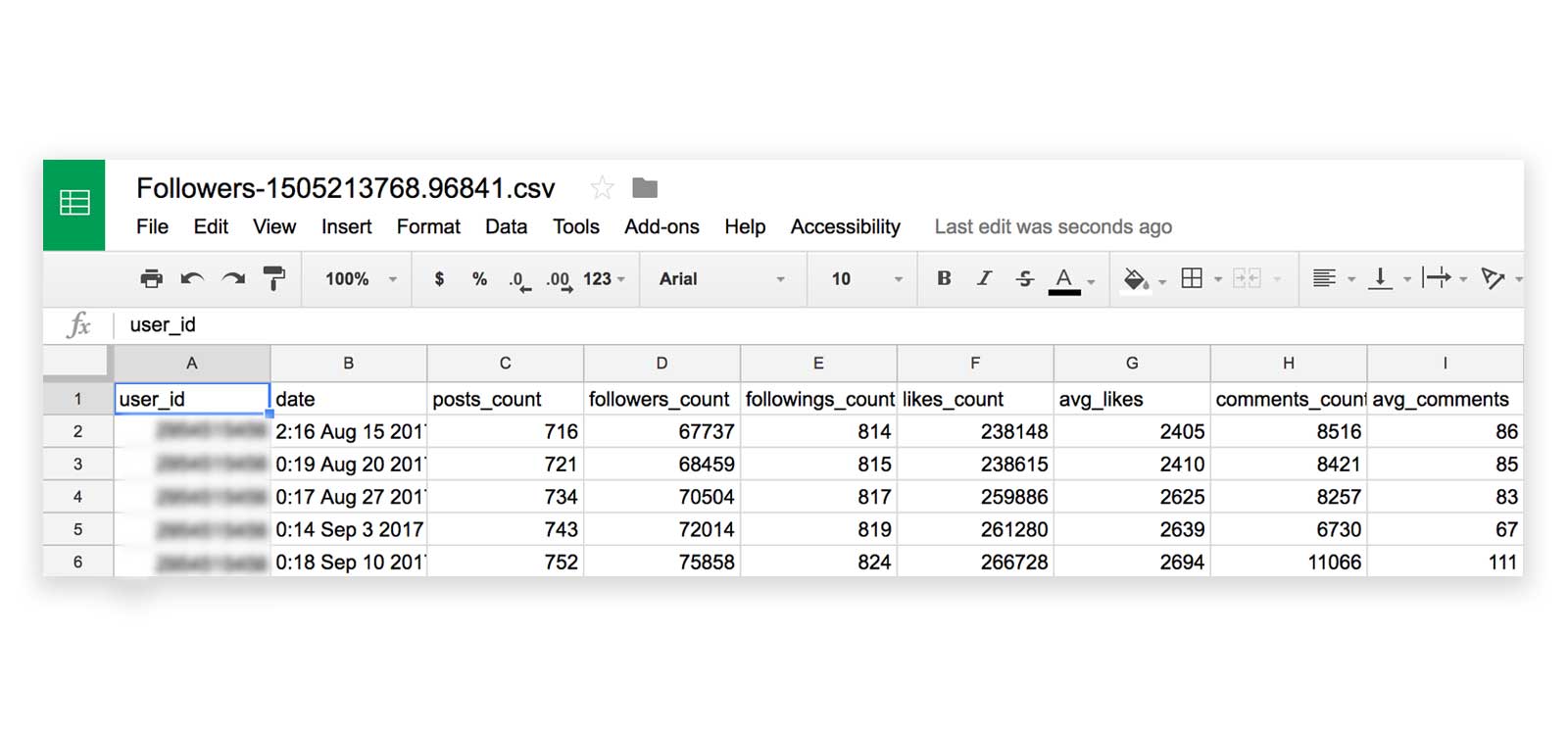
With some basic math we can calculate that during the first week, when only five posts were made, follower count increased by 722.
During the following three weeks, an average of eleven posts was made and the account received an additional 3,466 followers per week on average.
When the number of posts was doubled, the number of followers increased by almost five times. Posting more often is clearly worth the extra effort.
Engagement
What’s the point of having all those followers if they’re not engaging with you? The more a user engages with your content, the more likely it is they will continue to see your content.
How do you drive engagement?
You’re only limited by your creativity here, but some tried and true methods include:
- Engaging First
- Contests
- Questions
- Asking
- Rewards
- Cross-Promotion
1) Engaging with other accounts first is the most labor-intensive way to drive engagement and build your following. It’s also the most personal and can help you build a highly engaged community of followers. The point of engaging is to show up in a person’s activity feed in hopes that they notice and engage back, hopefully by following you.
You don’t want to engage with just anyone though. You want to engage with users who would be interested in your content. This way they are more likely to engage back and follow you. A few examples of choosing your target audience include:
An athletic clothing brand engaging with personal trainers. A search for #fitnesscoach will offer plenty of opportunities to find such an audience.
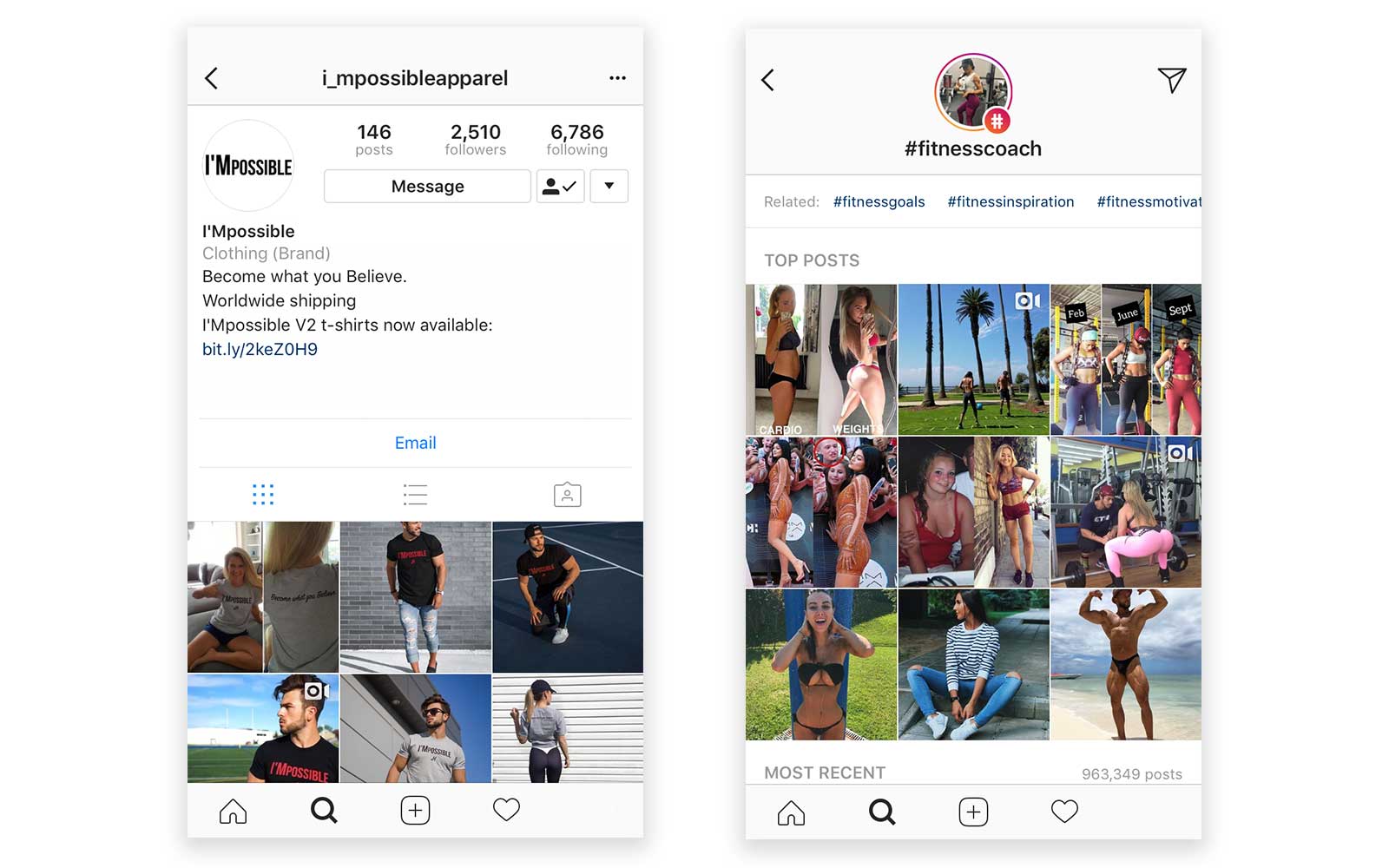
A restaurant engaging with people living in their community.
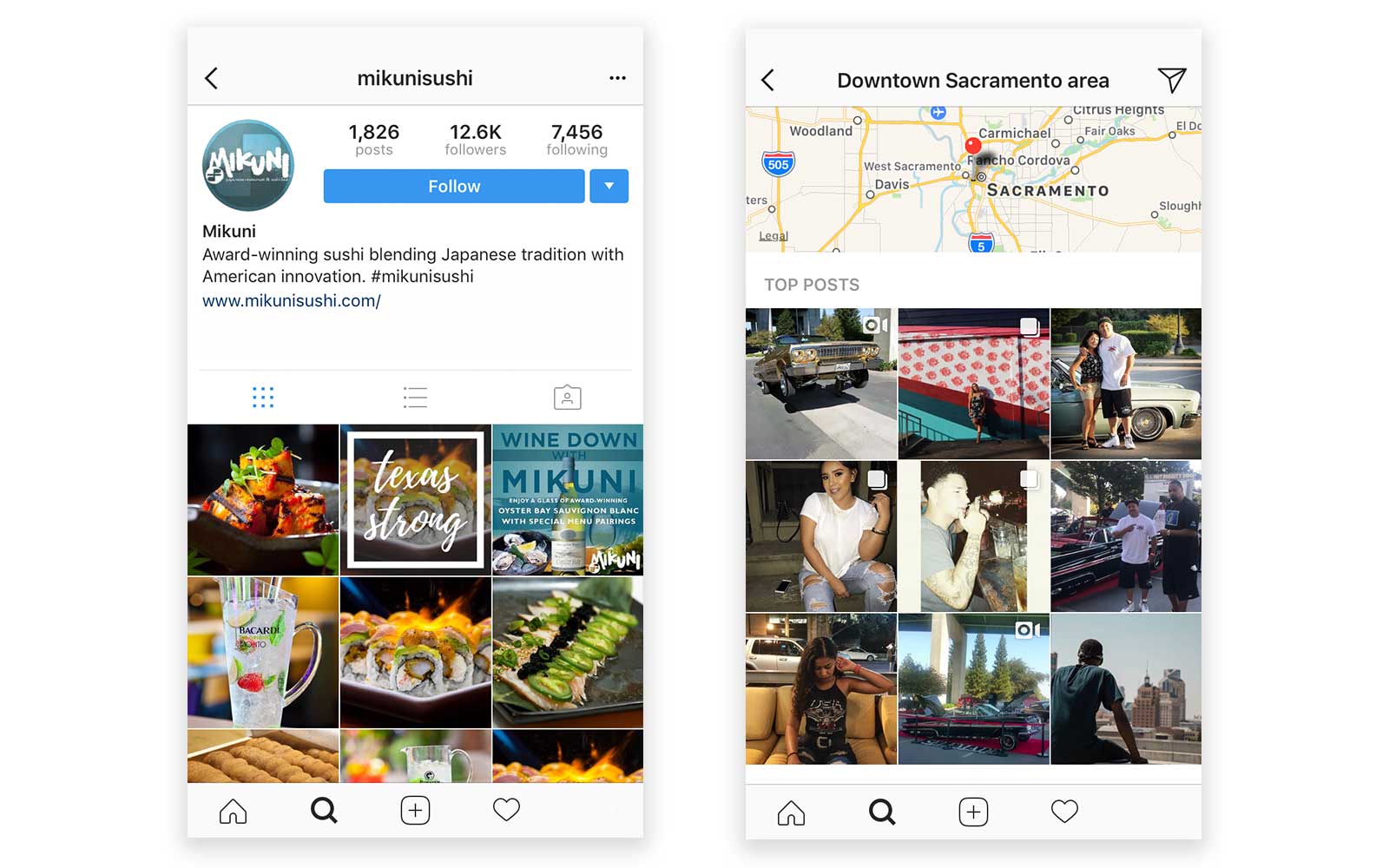
Mikuni Sushi in Sacramento, CA could do a quick location search for “Downtown Sacramento area” and engage with people currently or recently nearby. A restaurant could even leave a comment or DM them and offer a discount which was only good for that day to see some immediate results.
A skateboard company engaging with followers of a skateboarding feature page. A feature page like this one likely has followers who are also skateboarders, @bdskateco’s target market.
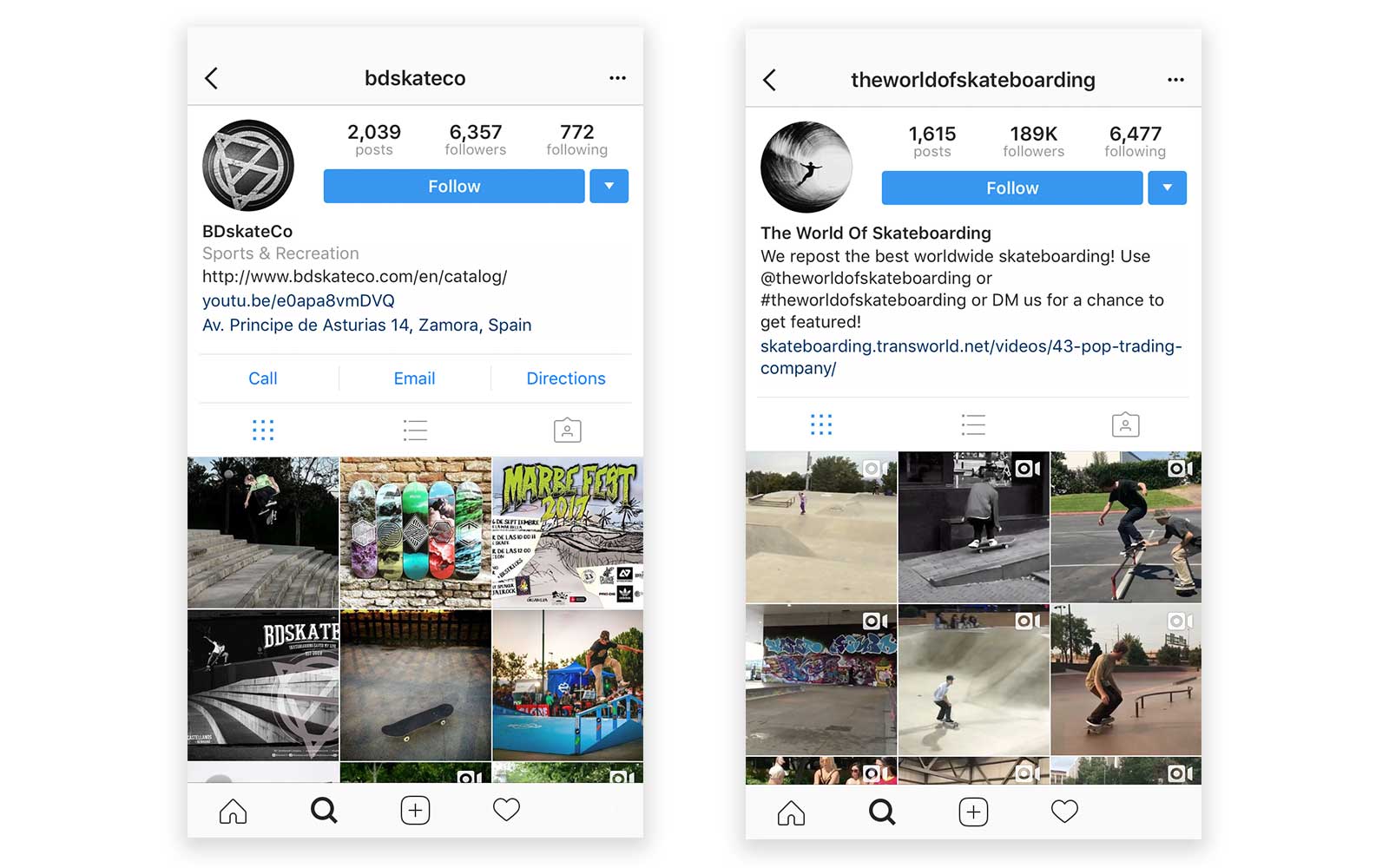
If a user follows back, you could direct message them with a promotional offer. Because they’re following you, you’ll get right to their inbox, which likely isn’t cluttered with a bunch of other messages…*cough, email.
The more you engage with someone, the more space you take up in their activity feed, the greater the chance that they take notice.
There are three actions you can take to engage first:
- Like
- Comment
- Follow
Liking older photos takes more time because you have to scroll through a person’s feed to reach these photos, but allows you stand out more because most people (or bots) only like the most recent one to three posts.
Leaving a (genuine) comment is a great way to stand out because after a user has checked his or her feed and all “likes” have been lumped together, your comment will continue to stand alone. Also, a genuine comment from an account is rare these days in a world of bots.
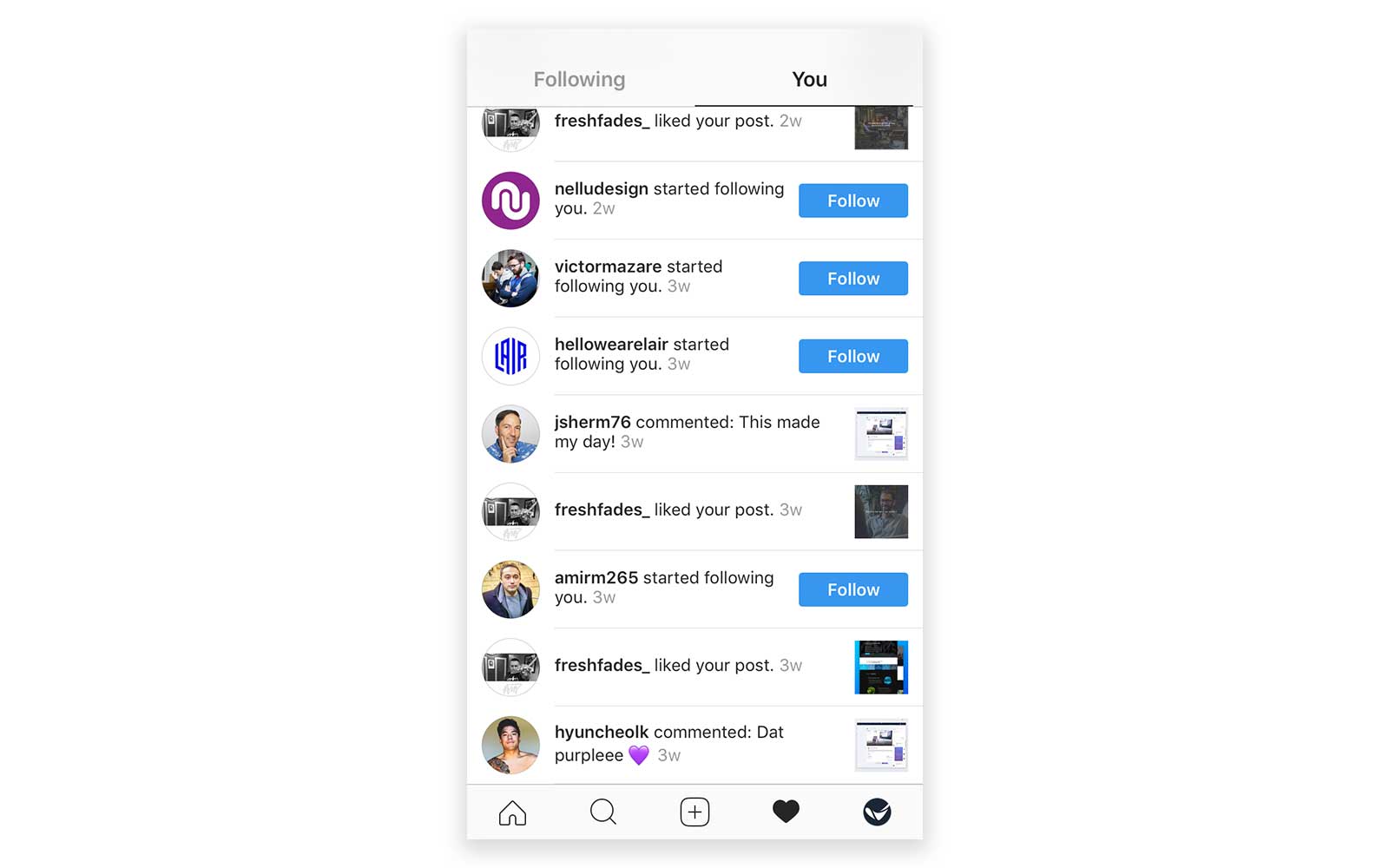
Having a hard time believing our post about a website design made @jsherm’s day…
The final way to engage is with a follow. Because of Instagram etiquette, this might be the most touchy way to engage with someone because if you later unfollow them it can have the opposite effect you’re looking for and hurt your brand.
Some people find the follow-unfollow tactic rude or simply annoying and there’s a good chance you’ll turn some people off completely by doing this. Also, if you rack up a high follower account, you’ll likely be seen as spammy.
2) Running a contest is a very common way of driving engagement and adding to your follower count at the same time. In exchange for your prize, you can ask your followers to engage with your post by liking and commenting something specific on your post (such as why they deserve the prize). To grow your follower count you can ask that they tag a certain number of their friends.
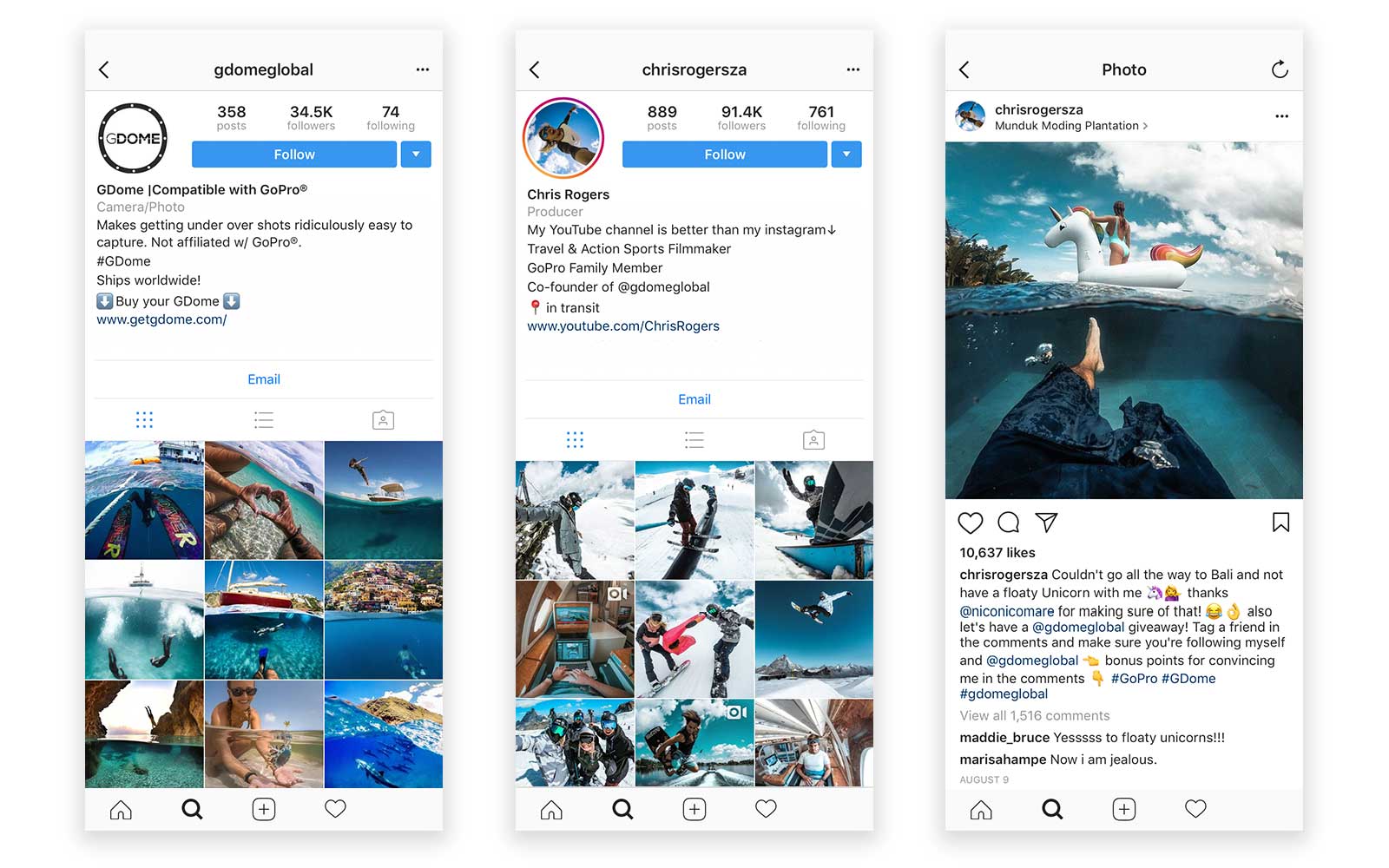
In the contest shown above (right), Chris Rogers, co-founder of GDome, a GoPro accessory company, gave away a GDome (valued at $99 on their website) to one person.
In order to enter, users had to tag one friend and follow both Chris and GDome on Instagram.
Normally he receives 100-200 comments. For the contest, he received 1,516 comments and some users tagged multiple friends in hopes of increasing their chances of winning. It was also his second most engaged with post ever. Not bad for the cost of one GDome, plus shipping.
What Chris did really well here was give away something of great value to his followers. His total cost was probably only $50-$80, but it was something his followers really wanted, so they happily engaged their friends.
Offering a $10 Starbucks gift card probably isn’t going to cut it. Users are often reluctant to bug their friends, so the prize has to provide enough value to overcome this reluctance.
Make sure you stay within Instagram’s guidelines when running a competition.
3) Asking a question is a free and easy way to drive engagement, but will usually only be effective if you have thousands of followers.
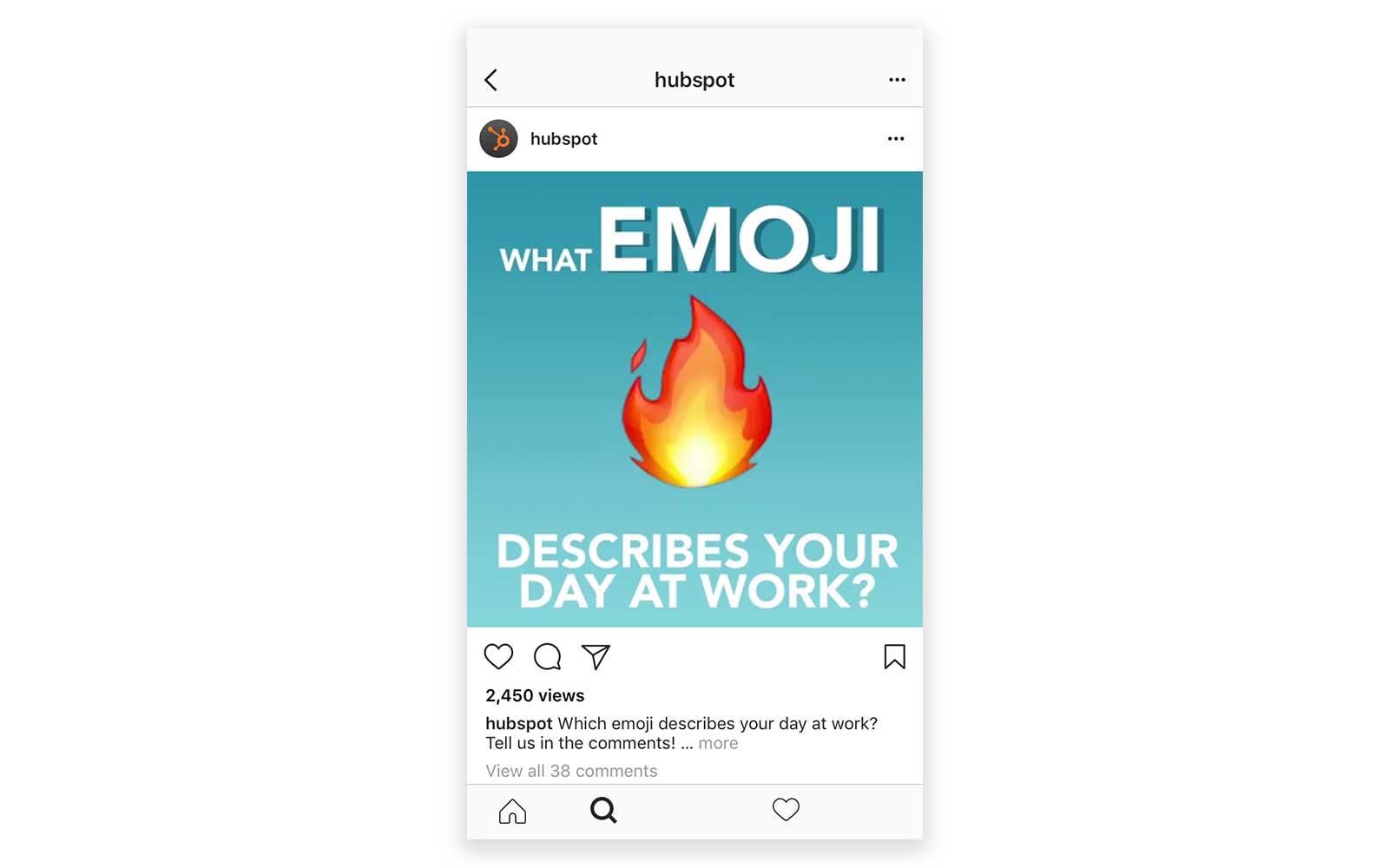
Hubspot keeps it simple by asking for an emoji response.
4) Asking is as straightforward as it sounds. Simply ask your followers to like and/or leave a specific type of comment such as an emoji. You can do this in your post caption or in your Instagram stories.
One form of this can include offering to check out and engage with followers who do this for you. If you’re a feature page you can also let followers know that you’ll be checking profiles of those who engage for feature posts.
5) Rewards can require smaller asks from your followers and therefore smaller rewards than competitions. The best example I’ve seen of rewarding followers has been by Gary Vaynerchuk who runs a “60 Second Club”.
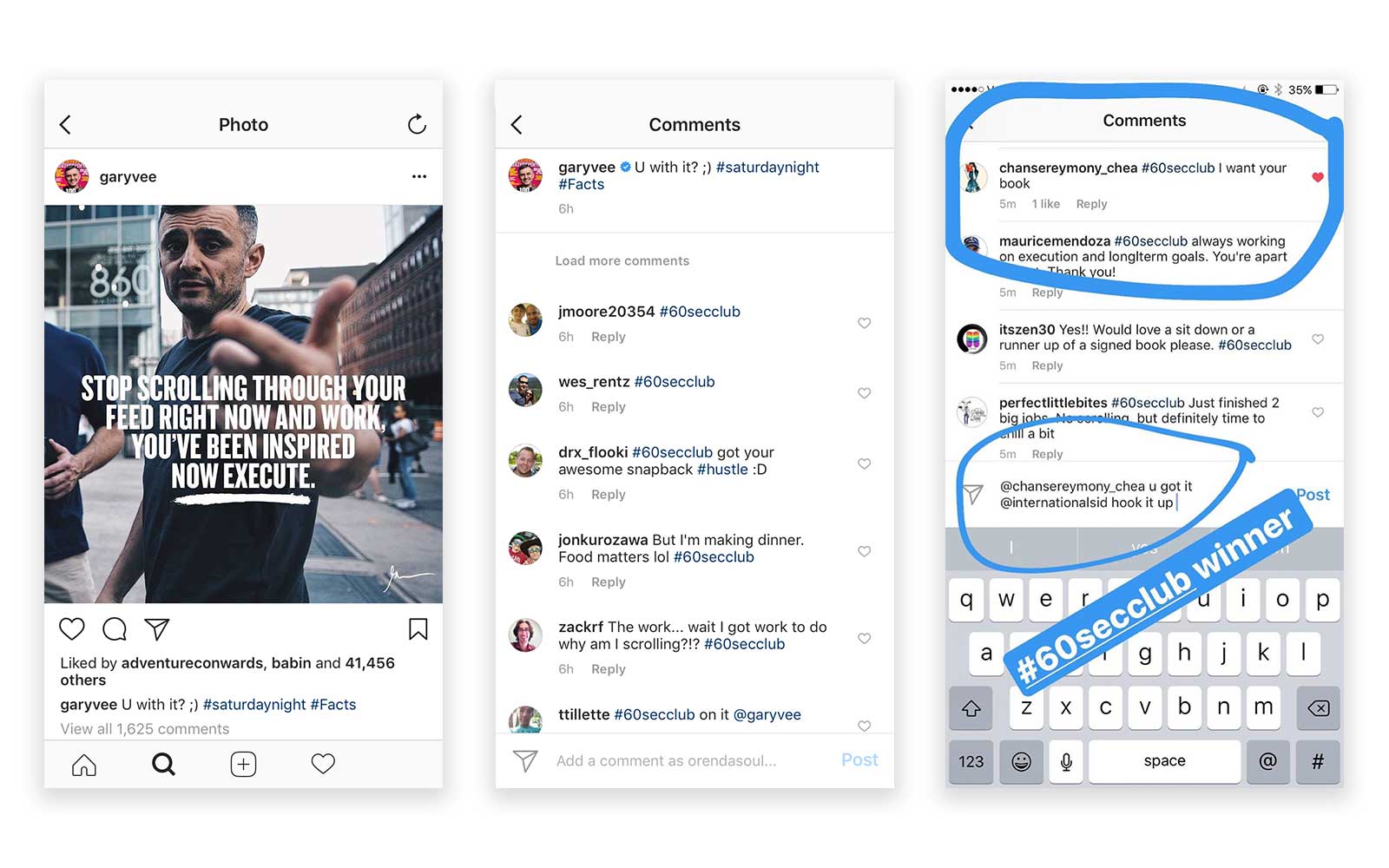
The rules are simple. Like and comment #60secclub within 60 seconds of the post going up. From the pool of followers who do this, he chooses one to reward. The reward is usually something small like a free signed book or a free t-shirt. But once in awhile, he gives something big away, like a 30-minute meeting with him.
Of course, to know that he’s posted within 60 seconds of him doing so requires that followers have their push notifications turned on.
This strategy works brilliantly for a couple reasons. The first is because it plays perfectly into Instagram’s algorithm which rewards immediate engagement. The second is because even if followers aren’t engaging with every piece of content, they’re constantly being reminded of your brand. In Gary Vee’s case, this happens multiple times per day.
6) Cross-promoting can be a very fast and powerful (and free) way of increasing your following. You’ll want to cross-promote with a profile who will have followers that will be interested in what you’re posting and vice versa.
Cross-promoting could be as simple as a post with a caption such as “If you like our content (which we know you do;), then you’ll love our friends over at @taggedprofile. Go check them out for some awesome stuff.”
Also, consider combining the above tactics. Using a competition in your cross-promotion can supercharge a boost in engagement and following.
Instagram Pods
Pods are groups of accounts and the people behind them who join forces to hack Instagram’s algorithm. Their main purpose is to drive engagement quickly after you’ve posted in order to give it that initial traction we discussed earlier.
Each pod has different rules and if you start your own pod, you make the rules. If you don’t follow the rules, you may get the boot.
As soon as you post, you’ll send a message to your pod and they’ll engage – hopefully quickly.
One very common rule is that you have to engage with a post within 24 hours of it going live. For this reason, pods will typically stay small (10-30 accounts). With too many people, keeping up could be daunting.
Because pods are necessarily kept small, you will (hopefully) outgrow them.
Takeovers
A takeover is when you allow a guest to take over your Instagram account at a specified time or period of time. They may make one or multiple posts during this time frame or they may take over your Instagram stories. This is a great way to engage with a new audience and integrate influencers into your growth strategy.
Each account gets to exchange exposure as the person taking over your account will let their audience know about the takeover and vice versa.
One takeover strategy is to do it with someone your audience is familiar with and would be excited about. For example, a photography brand could have a well-known photographer take over for the day. The photographer could post his or her own images that are exclusive to the takeover and wouldn’t be found anywhere else. Followers who are fans of said photographer would pay special attention to your account for the time and are more likely to engage.
This engagement will benefit you beyond just the initial attention you get because the algorithm is more likely to put your content higher in the user’s feed when they engage multiple times in one day.
Another strategy you can take is partnering with another brand your audience may be largely unfamiliar with, but who is highly relevant to their interests.
The same photography feature account could allow a new company offering a really cool photography related product to take over. Said company may post a few images throughout the day that shows how well their product works when used.
As long as the feature account was smart about the context of the takeover and the company doing the takeover provided a highly relevant and highly valuable product, the audience shouldn’t mind that it’s a company hoping to sell something doing the takeover.
Facebook Growth Hacking Using Instagram
Some of what I outline below assumes you’re not using a third party social media management tool such as AgoraPulse, Buffer, or Hootsuite.
If you are using one of those platforms, you can skip the Cross-Promotion section.
Cross-Promotion
Since Facebook owns Instagram, they’ve made sharing from Instagram to Facebook seamless and the cross-posting is hardly noticeable except for the subtle “Instagram” text in the post.
What is noticeable are the hashtags and any tags you include in the copy. Whether or not you should care depends on your brand and your goals. One could argue it looks less professional, but that may not matter depending on your brand image.
There are also a couple workarounds for this.
The first is to add your hashtags as the first comment on your post instead of in your caption and if you’re tagging an account, only include the tag in your image.
The second is to not include your hashtags or tag and then go back and edit the post to include the hashtags and/or tag. Once you’ve made the initial post, your edits on Instagram aren’t going to change your post on Facebook.
Video Is The Way To Go
Cross-promotion from Instagram to Facebook is especially powerful when you do it with video which is the most viral form of content on the platform. Because Instagram limits its videos to 60 seconds, you’re automatically fitting right into a sweet spot of video share length.
The graph below shows the average length of the top 10 most shared videos in September 2015 for some of the most successful media publishing companies on the Facebook platform. None of them is greater than 90 seconds.
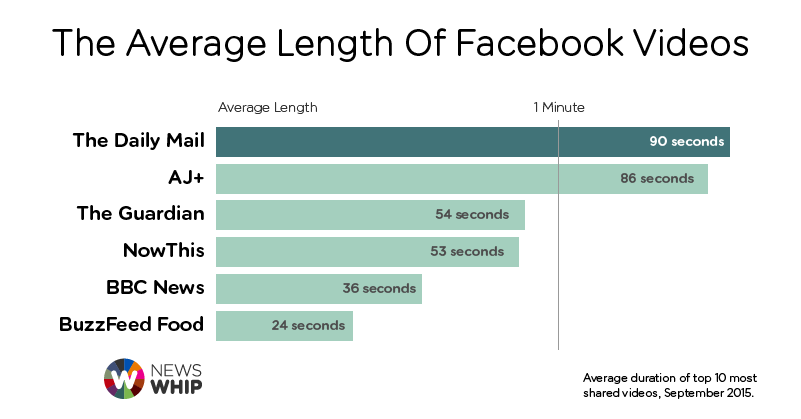
Spearfishing Reviews is a great example of this cross-promotion in action. They don’t tweak any of their posts when they share them on Instagram and even with the non-native appearance of their posts, they’ve been able to grow their Facebook account to over 120,000 fans.
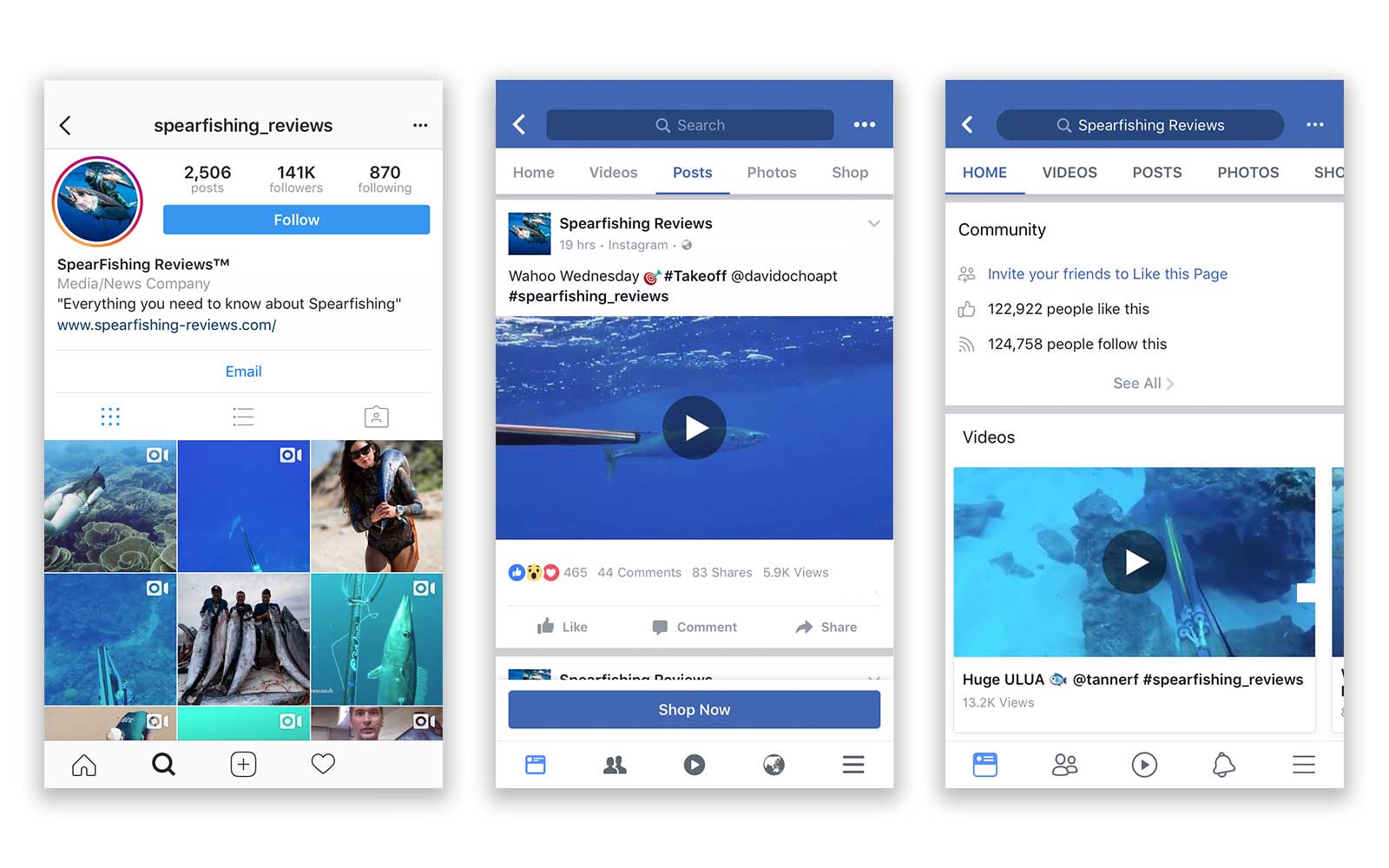
Some would argue that promoting the same content on Facebook doesn’t incentivize followers from Instagram to follow you on both platforms. And to a degree, they’re right.
To fix this, you can provide exclusive content, rewards, discounts, or contests on Facebook.
Also, the virality of Facebook video allows you to reach an audience that otherwise would not see your content at all, so while the content may not be original to your Instagram audience, it is to everyone else.
Additionally, when you’ve optimized your image for Instagram, it’s also optimized for Facebook, which now allows vertically oriented images to take up the most amount of space, just like Instagram.
At one point this wasn’t the case, forcing everyone to create two separate images. Since 56.5% of Facebook users only use the platform on mobile now, they decided to optimize the feed for mobile users, saving marketers some time.
One major difference between Instagram and Facebook is the ability to link out from the Facebook post. For this reason, it sometimes makes sense to provide a native post on Facebook or edit an Instagram repost with a link in the text.
In It For The Long Haul
It takes years to become an overnight success.
Whether you’re attempting to grow your personal brand, increase your businesses’ presence, or build a business from the ground up using Instagram, it all takes time, work (emphasis on the work), and a little bit of luck.
Your numbers will likely be abysmal at first. Then less abysmal six months in. Then, eventually, with some patience, persistence, and skill, your numbers will grow and you may just find the success you’re looking for.
